

Farm Bureau
Celebrating 81 Years!
Local Farmers Feeding Your Family
Farm Bureau invests over $35,000 in Delaware Youth at Junior Livestock Auction
By Jaiden Cain
Delaware Farm Bureau
Demonstrating their strong commitment to supporting the next generation of agricultural leaders, the Farm Bureau invested over $35,000 at this year’s Junior Livestock Auction at the Delaware State Fair in Harrington on July 24, 2025.
Each year, junior exhibitors in the beef, swine, sheep, and goat departments compete for a spot in the Junior Livestock Auction, which features the top three beef cattle and goats and the top four hogs and lambs from each class. Animals are sold to the highest bidder, who may choose to keep the animal or donate it back to the exhibitor, 4-H, or FFA programs.
This year, the Delaware Farm Bureau (DEFB) purchased the grand champion goat, exhibited by Mckenna Vest of Clayton, early in the auction. They continued their support by being the highest bidder on seven
additional animals, extending their support across all species and youth in all three counties. All animals purchased by DEFB were donated back to the 4-H and FFA, amounting to over $22,000 in total support for Delaware junior exhibitors.
County Farm Bureaus and committees also got in on the action. Kent County Farm Bureau spent just under $3,000, New Castle County Farm Bureau and Sussex County Farm Bureau each spent just over $4,000, and the Young Farmers and Ranchers committee spent $2,100 on a hog for their half-a-hog raffle.
“We’re fortunate to support young exhibitors at this level and proud to invest in the future of agriculture,” said DEFB President Bill Powers.
“But it’s not just about the winning bids; every back bid helped those kids earn more for their animals. Everyone who participated made a difference.”
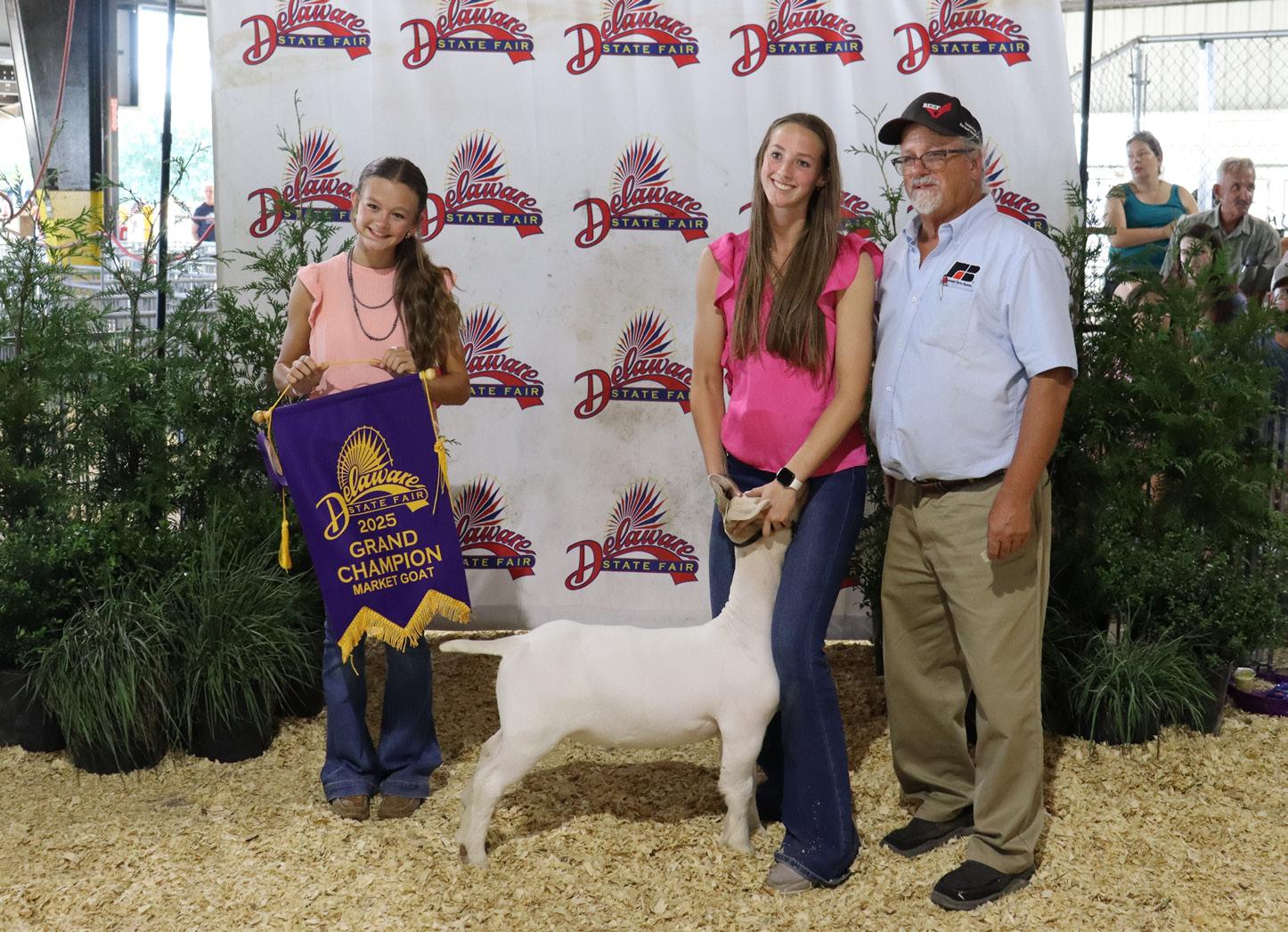
In this issue
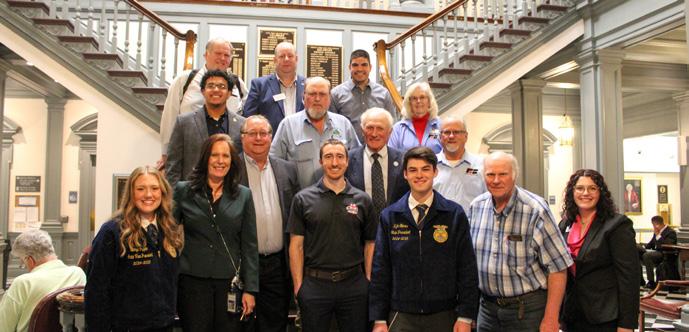

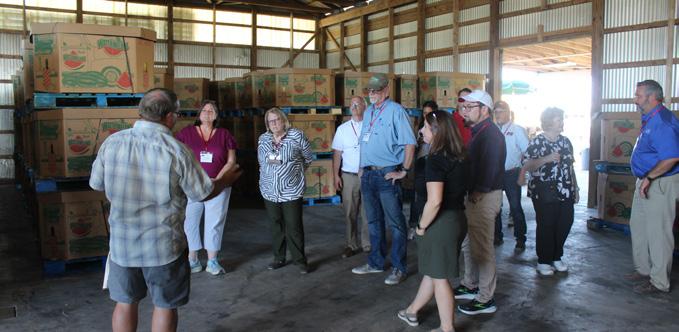

DEFB Legislative Highlights Page 5
Northeast Farm Bureau Presidents and Administrators Conference Page 19
DEFB Scholarship Recipients Page 16
DEFB President Bill Powers with McKenna Vest of Clayton and her Grand Champion Goat at the Junior Livestock Auction held at Delaware State Fair in Harrington.
From the President’s desk
Your Voice is Our Strength in Shaping Delaware Agriculture
As the harvest season approaches and we reflect on the work we've done across our farms and communities, I want to speak directly to the heart of what makes the Delaware Farm Bureau strong: you.
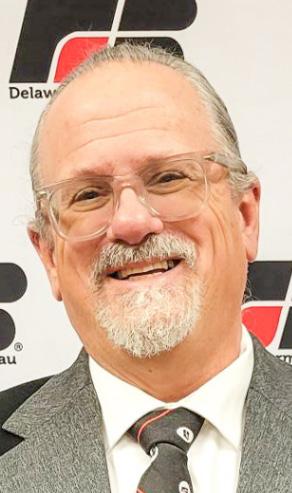
Bill Powers DEFB President
Each year, the Delaware Farm Bureau Annual Meeting brings together farmers from all three counties of our state, not just to celebrate our shared values, but to shape the future of agriculture in Delaware. And at the center of that process is our delegation.
This year’s annual meeting will kick off our two-day DEFB Convention on December 12 and 13. It’s a special time to gather, connect, and make decisions that impact not only our farms but our entire agricultural community. Your engagement as a delegate plays a direct role in shaping the policies that guide our work—not just within the Farm Bureau, but also at Legislative Hall.
In fact, 2025 was one of our most impactful years yet for policy advocacy. Thanks to member-driven priorities and increased grassroots participation, the Delaware Farm Bureau took bold steps forward in protecting farmland, promoting rural economies, and defending local
control.
Member engagement increased dramatically, helping to shape more than 15 pieces of legislation. At the heart of these victories? You. The policies you help create at our annual meeting provide the foundation for our advocacy work. When you serve as a delegate, your voice goes far beyond the convention—it reaches the legislative floor at the county, state, and federal level, and shapes the laws that govern our land, water, and agricultural economy.
Being a delegate isn’t just a title. It’s a responsibility. It’s a voice. It’s your chance to represent the needs, concerns, and ideas of your county. When you serve as a delegate, you help determine our policy positions, elect our leadership, and ensure that the issues facing your farm and your community are heard loud and clear.
Here’s why you should consider being a delegate this year:
• Your Voice Matters – No matter what you grow or produce, no one knows your operation better than you. As a delegate, you ensure your perspective is part of our policy discussions.
• Shape the Future of Agriculture – The decisions we make at our annual meeting guide our advocacy efforts in Dover and Washington. From water rights and land use to labor and taxation, these policies start with you.
• Build Stronger Connections
– The annual meeting is also about fellowship. As a delegate, you’ll work alongside other passionate members who share your values and your challenges. It’s a chance to network, share ideas, and strengthen our Farm Bureau family.
• Protect the Next Generation –Many of us are working hard to ensure our children and grandchildren can continue the legacy of agriculture. By being part of the policy process, you help create a better future for the next generation of Delaware farmers.
If you’re interested in serving as a delegate, I encourage you to contact your county president:
• Kent County – Jim Minner: jamesminner@comcast.net or 302-270-3341
• New Castle County – Stewart Ramsey: stewart@ramseysfarm.com or 302-5404680
• Sussex County – Steve Breeding: spbreeding@ gmail.com or 302-381-6129
Let’s make sure that when decisions are made, Delaware farmers are not only in the room—but leading the conversation.


The Zipline
The Power of Our Grassroots
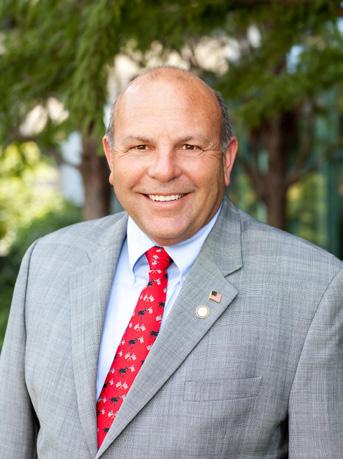
One of the great honors of my role as American Farm Bureau president is sharing the stories of farmers and ranchers from across this country with leaders who are making decisions that directly impact our work, our families, and our livelihoods. From lawmakers on Capitol Hill all the way to the White House, I am humbled to sit across from powerful leaders to help them understand how you grow the food, fiber, and renewable fuel our nation and the world depends on. And I have that seat because of you, because they want to hear your stories. Like all Americans, our nation’s leaders, including the President of the United States, want to understand where their food comes from.
Recently, I had the privilege of sitting down for a direct conversation with President Trump in the Oval Office. We had a full discussion about the pressing issues impacting your families, your farms, and the farm economy. He asked me a lot of questions about farming which gave me the opportunity to explain the science behind our farming practices and the tools that we use. Thanks to your grassroots efforts, our nation’s leaders are seeing that what matters to agri-
culture should matter to all Americans. You, as farmers and ranchers, play a critical role in keeping our food supply secure, providing nutritious food for our families, and protecting our natural resources.
I expressed Farm Bureau’s appreciation to President Trump and his administration for the agriculture and tax provisions in the One Big Beautiful Bill Act. I shared with the President how this year’s crop is the most expensive we have ever put in the ground, and that this law is bringing much-needed relief with increases to outdated reference prices and funding for other risk management tools. But I also emphasized that it’s time to finish the job with an updated farm bill to address other programs and policy improvements that are important to farmers and ranchers.
As you might have guessed, we also discussed trade and the importance of opening new markets for farmers and ranchers. I shared that farmers are eager to follow the success of the administration’s new deal with the U.K. with even more trade deals to open up markets across the globe. America’s farmers and ranchers are growing some of the best products in the world, safely and sustainably, as I shared with the President, and we’re long overdue for a level playing field in countries that have thrown up non-scientific barriers to American-grown products. I also emphasized that we are eager to see trade disputes resolved swiftly and that our policy does not sup-
port tariffs. The President assured me that boosting U.S. agriculture would remain a priority in negotiating new deals.
The President and I discussed other challenges and concerns weighing on farm families right now. I emphasized that labor is the greatest limiting factor to U.S. agriculture, and without a stable, legal workforce, we cannot continue to grow the healthy food that American families count on. If we want to boost American-grown products, we need to reform our
H-2A guestworker program. I shared with him the personal stories that I have heard from farmers on these challenges: how you cannot afford the dramatic hikes in the H-2A wage rate and how farmers, despite extensive efforts, have been unsuccessful in recruiting domestic workers to fill these essential roles.
We also discussed the important role pesticides play on the farm, both

issues impacting rural communities.

Zippy Duvall American Farm Bureau Federation President
AFBF President Zippy Duvall met with President Trump in the oval office to discussing
Catching up with the Counties New Castle County Farm Bureau encourages community support in legislation, events
On August 10, New Castle County Farm Bureau held its 2nd Beef and Beer Fundraiser at the Odessa Fire Hall. The event was a huge success thanks to our strong, connected, and supportive community.
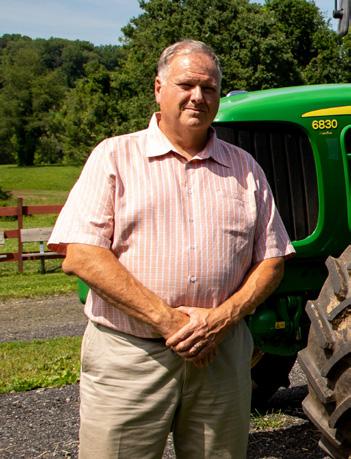
With the help of local farmers, businesses, volunteers, and everyone who came out to join us, we had an amazing night. It brought people from all over the county together to celebrate farming and support the important work of the Farm Bureau.
We raised over $10,000 at the event, which NCCFB will use to reinvest in our agricultural community. Last year, these funds supported scholarships, donations, and sponsorships that helped farmers
and agricultural groups throughout the area. Investing in youth involved in agriculture remains a top priority because they are the future of our industry.
I want to extend a big thank you to everyone who donated, sponsored, volunteered, or simply came out to enjoy the evening. Your support means everything.
Here’s to many more great events and a bright future for farming in Delaware!
I’d also like to briefly address some recent legislation passed during the special session of the Legislative General Assembly and signed into law by Governor Meyers in August.
One key bill, House Bill 242, permits New Castle County school districts to reset their tax rates for the 2025-26 year and reissue a tax warrant, allowing them to set different rates for residential and nonresidential properties. Nonresidential taxes can be up to twice the residential rate. Thankfully, after
some clarification, it appears that most farms are classified as residential for tax purposes.
We will continue to monitor this issue closely and work to ensure
that farming families are protected. Thank you again for your continued support of our farming community.
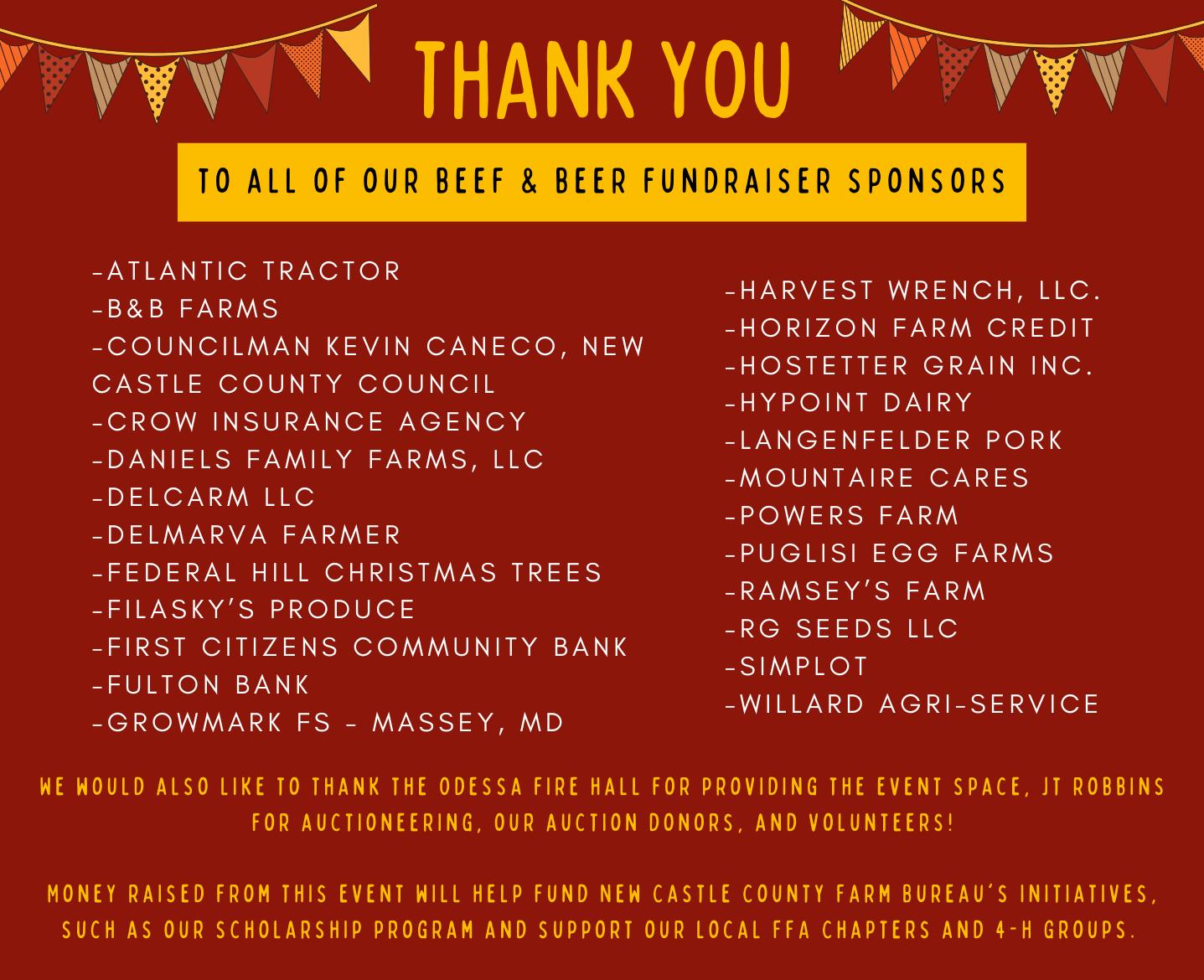
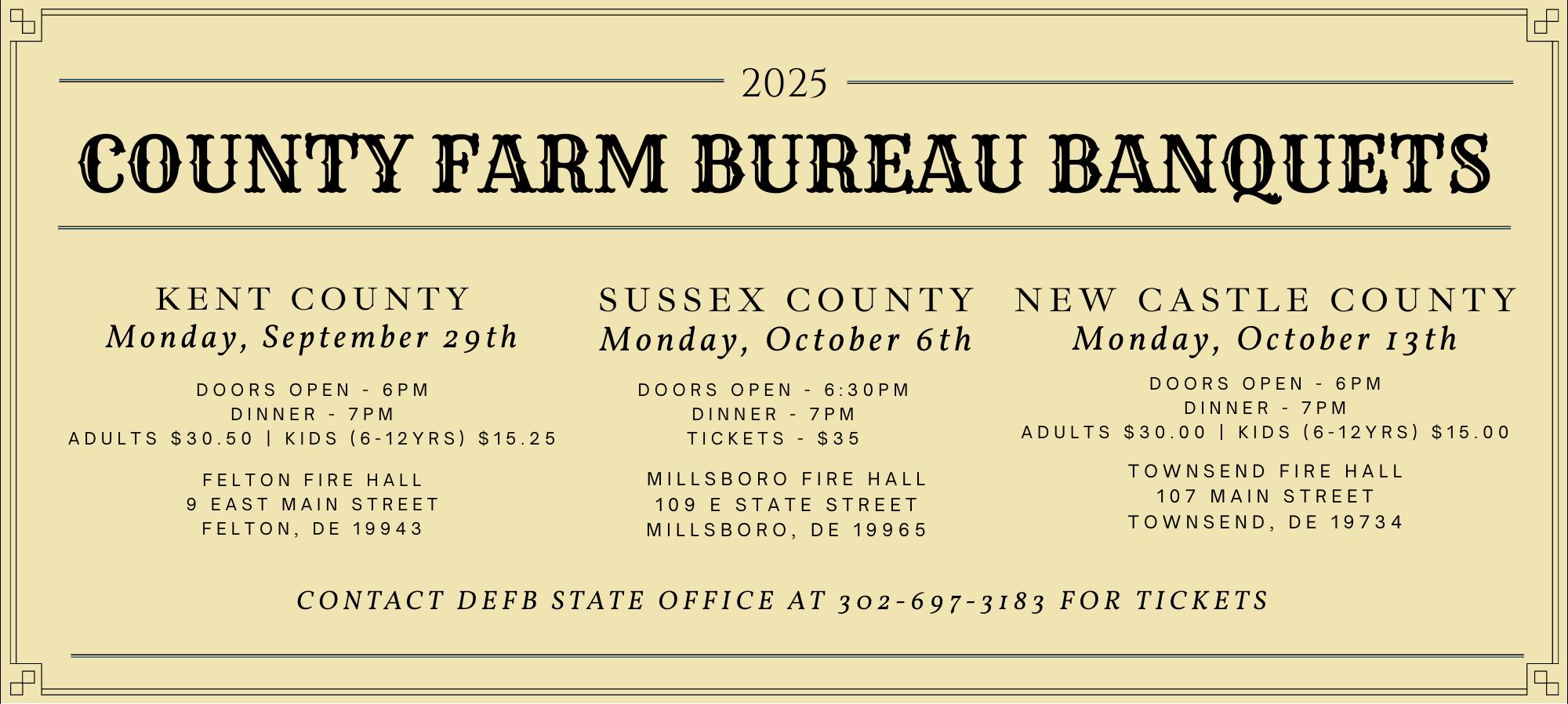
Stewart Ramsey NCCFB President
Government Affairs Policy in Action: 2025 DEFB Legislative Highlights
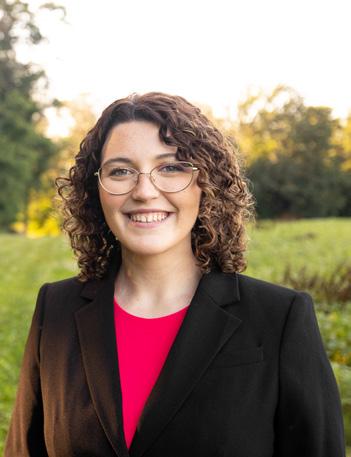
The 2025 Delaware Legislative Session yielded several key victories for Delaware Farm Bureau (DEFB) members, agriculture, and related industries. The session officially concluded on June 30, marking the end of the first leg of Delaware’s twoyear 153rd General Assembly. DEFB members guide advocacy efforts by developing policies for the organization’s policy book. DEFB leadership, members, and staff submitted testimony and provided input on more than 15 pieces of legislation. Member engagement reached an all-time high, soaring more than 800% compared to previous years, driven by hundreds of members and supporters using our Voter Voice advocacy platform. This remarkable growth highlights the strength and impact of grassroots advocacy. Below is a summary of the legislation DEFB focused on during the 2025 session.
Agriculture
HB 117/SB 190
Senate Bill 190, a substitute for House Bill 117, requires state agencies to notify DEFB when state-owned or political subdivision agricultural land becomes available for lease. DEFB submitted supportive comments and appreciates Rep. Carson’s (D-NC) commitment to addressing challenges farmers face in accessing state-owned farmland. His interest in the issue was sparked by discussions at the 2025 New Castle County Legislative Breakfast, where DEFB members highlighted it as a key concern. SB 190 passed both chambers and was signed by the Governor on August 12, 2025.
HB 176
HB 176 revisits the ongoing Right to Repair issue, with a focus specifically on agricultural equipment, unlike the broader 2021 bill introduced by former Rep. Ruth Briggs King. The American Farm Bureau Federation has Memoranda of Understanding (MOUs) with major equipment manufacturers, and HB 176, as written, would violate those agreements. As a result, DEFB opposes the bill in its current form.
However, DEFB is actively working with the bill’s prime sponsor, Rep. Rich Collins (R-S), as well as equipment manufacturers and dealers, to find a solution that works for all parties. Though filed in 2025, HB 176 is not scheduled for committee consideration until January 2026.
SB 35/SCR 106
Senate Bill 35 sought to address the taxation of agricultural structures by allowing counties to apply the same assessment method currently used for farmland. However, due to its significant projected fiscal impact, the bill stalled in the Senate Finance Committee.
Determined to keep the issue moving forward, DEFB worked with SB 35 prime sponsor Sen. Kyra Hoffner (D-NC) to pivot toward an alternative solution: Senate Concurrent Resolution 106. This resolution tasks the State Farmland Assessment Advisory Commission with researching how other states tax agricultural structures and reporting its findings to the General Assembly by March 2, 2026.
While not the immediate solution DEFB had hoped for, SCR 106 ensures the issue remains a priority for state lawmakers. The resolution passed both chambers, and DEFB will closely monitor the Commission’s progress.
Development/Business
Substitute 2 for HB 187
marks a meaningful win for Delaware’s wine producers, allowing for in-state wine shipments for the first time. While the bill includes some limitations, DEFB views it as a strong first step in supporting the growth of the state’s wine industry and broader agricultural economy.
DEFB testified in support of the bill and greatly appreciates the leadership of Rep. Michael Smith (R-NC) in advancing it. The legislation passed both chambers on June 30 and was signed by the Governor on August 15, 2025.
Eminent Domain
SB 114
Senate Bill 114, sponsored by Sen. Dave Wilson (R-K, S), aims to strengthen protections against the misuse of eminent domain by municipalities. The bill would prohibit the use of eminent domain to acquire private property for recreational purposes and reinforce compliance with existing procedures outlined in Chapter 95 of Title 29 and §120 of Title 22.
DEFB submitted comments in support of the bill, recognizing its value in upholding private property rights and guarding against government overreach. Although SB 114 was not released from the committee, DEFB appreciates Sen. Wilson’s continued efforts to defend landowner rights.
Energy
SB 175
More than 200 farms currently use renewable energy systems, such as solar, but many DEFB members have expressed concerns about losing unused solar energy credits.
Senate Bill 175, sponsored by Sen. Stephanie Hansen (D-NC) and Rep. Frank Burns (D-NC), addresses this issue by allowing farmers to roll over unused energy credits instead of forfeiting them at the end of the billing cycle.
DEFB supported this legislation and is pleased to see farmers fairly compensated for their contribu-
tions to renewable energy. SB 175 has passed both chambers and was signed by the Governor on July 16.
Environment/Pollution
HB 210
House Bill 210, also known as the “Pollution Accountability Act,” increases environmental fines for commercial and industrial polluters who violate water, air, and waste regulations. The legislation raises the minimum fine from $25 to $250, the mid-range fine from $1,000 to $5,000, and the maximum fine for chronic violators from $10,000 to $40,000.
Initially, the bill included Title 3 of the Delaware Code, which would have extended these increased fines to the Nutrient Management Program. However, key stakeholders, including the Delaware Department of Agriculture (DDA), the Nutrient Management Commission, DEFB, and the Delmarva Chicken Association, were not consulted during the drafting process.
After DEFB and others raised concerns, the bill’s prime sponsor, Rep. Lambert (D-NC), met with stakeholders to better understand the agricultural impact. In response, Rep. Carson (D-NC) filed House Amendment 1, which removed Title 3 from the bill and addressed many of the agriculture community’s concerns. However, Concentrated Animal Feeding Operation (CAFO) permit holders may still be impacted. DEFB is hopeful that negotiations of the existing Memorandum of Agreement between DDA and DNREC will result in similar treatment for CAFOs as those in the Nutrient Management Program. HB 210, as amended, passed both chambers and was signed by the Governor on July 16. DEFB believes agriculture’s initial inclusion stemmed from a lack of understanding of the industry and its regulatory framework and is com-
Sydnie Grossnickle DEFB Government Affairs Coordinator


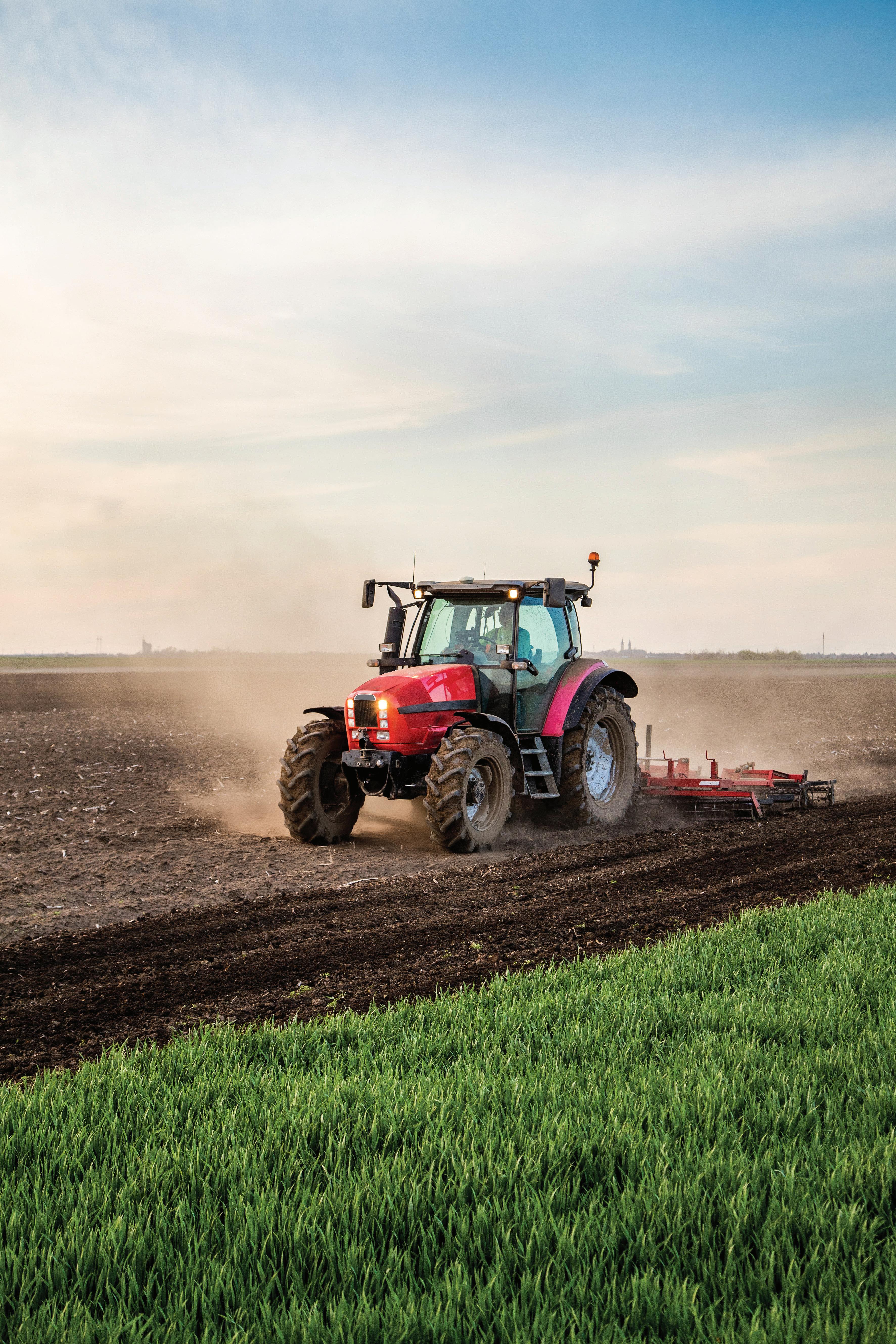



-mitted to working with partners and legislators to close that knowledge gap moving forward.
HB 222
Following the removal of Title 3 from HB 210, HB 222 was introduced to raise fines related to the Nutrient Management Program. Although the increases are more moderate than those in HB 210, HB 222 raises the minimum fine from $25 to $125 and the midrange fine from $1,000 to $5,000, while keeping the maximum fine at $10,000. Rep. Lambert (D-NC) hoped for HB 222 to pass alongside HB 210, but the bill’s Senate approval is delayed until 2026 thanks to Sen. Brian Pettyjohn (R-SC) and the Senate Republican Leadership, who secured this during Bond Bill Negotiations.
Local Authority
SB 159/SB 199
Senate Bill 159 mandates that an electrical substation be permitted as a conditional use in heavy industrial zones under specific circumstances, namely, when the substation supports a proposed
renewable energy project of 250 megawatts or more. Effectively, it allows such projects to bypass county-level approval. Filed by Sen. Stephanie Hansen (D-NC), the bill was a direct response to the Sussex County Council’s denial of a permit for US Wind’s offshore wind project and includes retroactive provisions to address that specific case.
Supporters, particularly New Castle County legislators, argued that Sussex County should not have authority over energy projects impacting other counties. In contrast, Republican lawmakers from Kent and Sussex Counties warned that overriding local decisions sets a dangerous precedent, threatening county authority and community input.
Despite the strong opposition, SB 159 passed both chambers with amendments and was signed into law by Governor Meyer on the final day of session. To secure final agreement on the Bond Bill (SB 200), Senate Republicans negotiated a delay in SB 159’s implementation through companion legislation, SB 199. This measure postpones the enactment of SB 159 until January 31, 2026, effectively approving US Wind’s permit by
that date, regardless of any ongoing legal challenges. SB 199 was also signed into law on June 30.
DEFB strongly opposed SB 159, aligning with its policy that land use decisions should remain at the county level. The organization voiced concerns that the bill opens the door to excessive state overreach and undermines local decision-making. DEFB members, leaders, and staff submitted written testimony and spoke out at multiple hearings.
DEFB commends legislators like Sen. Brian Pettyjohn (R-S) for standing up for rural communities and advocating for local control throughout this process.
Conclusion
This legislative session was a pivotal year for Delaware agriculture, with DEFB and other stakeholders playing a proactive and influential role in shaping policy outcomes. From protecting property rights and promoting more accessible agricultural lease opportunities to navigating complex environmental legislation, DEFB remained an advocate for farmers, rural communities, and the future of agriculture.
This year's unprecedented in-
crease in member engagement demonstrated the impact of collective action and shows the importance of continued involvement in the legislative process. As we prepare for the second leg of the 153rd General Assembly in 2026, DEFB remains committed to amplifying the voice of agriculture, holding policymakers accountable, and ensuring that Delaware’s farmers are informed, empowered, and represented at every step.
DEFB appreciates its members, partners, and legislative allies for their support throughout this session, and looks forward to building on these efforts in the year ahead.
Stay informed on key legislative issues by signing up for DEFB Action Alerts through Voter Voice at defb.org/advocacy/.
For a deeper look at DEFB’s policy positions, explore our Policy Book at defb.org/resources/farmer-information.
If you’d like to learn more about our advocacy efforts or find ways to get involved, contact Sydnie Grossnickle, DEFB Government Affairs Coordinator, at 302-6973183 or sydnie.grossnickle@defb. org.
State Calls Special Session in Response to New Castle County Property Tax Crisis
By Sydnie Grossnickle Delaware Farm Bureau
Delaware’s Court of Chancery has mandated a statewide property reassessment following a 2018 lawsuit challenging the fairness of the state’s public school funding system. Before this rule, it had been decades since counties last updated property values: Kent County in 1985, New Castle County in 1984, and Sussex County as far back as 1974. In 2021, all three counties agreed to move forward with updated assessments. Kent County completed its reassessment last summer, resulting in sharp increases in property taxes for residents, including farmers. New Castle County completed its reassessment this year, with many property owners facing tax increases of up to 500%. Farmers
in New Castle County, much like those in Kent the year before, were among the hardest hit.
To address growing concerns, the Delaware General Assembly convened a Special Session on Tuesday, August 12. Legislators considered seven pieces of legislation, all of which passed both chambers and were signed into law by Governor Meyer that same evening. The Delaware Farm Bureau played an active role during the session, ensuring that the voices of farmers were represented.
Key Legislation Passed:
House Bill 240 (Rep. Kimberly Williams) requires counties to issue refunds for property tax overpayments over $50 following an assessment appeal. For amounts under $50, counties may apply the credit to future taxes.
School tax overpayments follow the same rule.
House Bill 241 (Rep. Nnamdi Chukwuocha) allows residential taxpayers with primary residences to pay increased school taxes in three equal installments if their bill rises by $300 or more. Late fees, interest, and penalties are waived for those enrolled in the plan, and New Castle County’s school tax late payment penalty is reduced to 1% per month.
House Bill 242 (Rep. Kimberly Williams) permits New Castle County school districts to reset tax rates for the 2025–2026 year and reissue a tax warrant, differentiating between residential and non-residential rates. Non-residential rates must be at least equal to, but no more than twice, the residential rate. The property tax payment deadline is extended to
October 30, 2025.
Senate Substitute 1 for SB 202 (Sen. Kyra Hoffner) requires New Castle County to submit quarterly reports detailing parcel classifications, payment plan status, and other property data.
SB 203 (Sen. Spiros Mantzavinos) and SB 204 (Sen. Brian Pettyjohn) codify the authority of counties and municipalities to tax different classes of real property separately, provided classifications are reasonable and rates remain uniform within each class.
Senate Concurrent Resolution 122 (Sen. Bryan Townsend) calls for an immediate review of the statewide reassessment, urging collaboration among state, local, and school district officials to SPECIAL SESSION CONTINUED TO PAGE 15
Committee Corner
Keeping Tradition Alive: Reflections from the YF&R Antique Tractor Pull
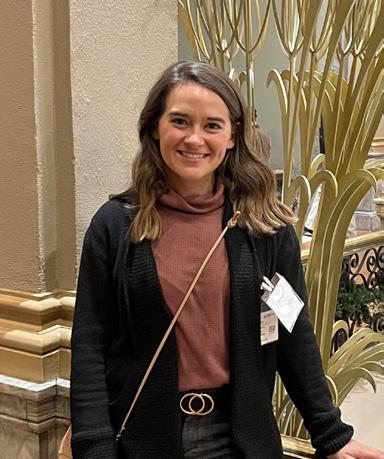
Casey Collier-Betts
DE YF&R Vice Chair
On July 26, the Delaware Farm Bureau Young Farmers & Ranchers (YF&R) hosted our 31st Annual Antique Tractor Pull at the Delaware State Fair. We had an outstanding turnout this year, with 80 hooks hitting the track and crowds cheering every step of the way.
If you’ve never experienced an antique tractor pull, it’s hard to put into words just how exciting and nostalgic it can be. While it's certainly a competition, it’s also so much more than that. This event is a celebration of tradition, community, and the agricultural heritage that defines our state. Whether you’ve spent a lifetime around tractors or you’re attending your very first pull, there’s something special about seeing those vintage
machines thunder down the track.
Our Annual Antique Tractor Pull isn’t just about fun, it also helps fund the important work of the YF&R Committee. One of our key initiatives is supporting the next generation of agricultural leaders through scholarships. This year, we proudly announced our 2025 scholarship recipients, Brielle Carter and Elizabeth Handlin, during the event. Funds raised also help send YF&R members to leadership conferences and training opportunities, ensuring we’re equipping young agriculturalists with the tools and connections they need to be leaders in this industry.
An event of this size doesn’t happen without a lot of hard work and generous support. We’re incredibly grateful to the Delaware State Fair and the Delmarva Pullers Association for partnering with us each year to make this event possible. And to all the pullers who showed up with their time, talent, and trusty tractors, thank you.
We’d also like to give a special
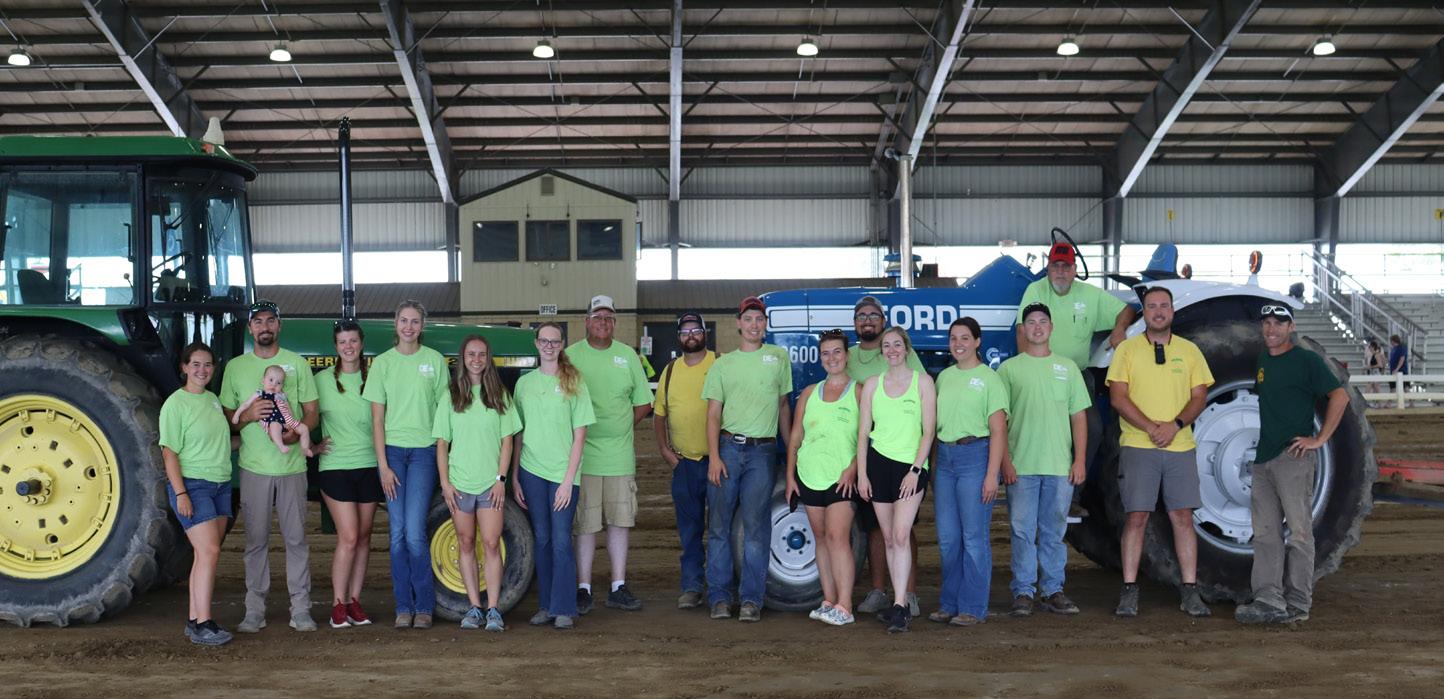
The DEFB Young Farmers and Ranchers Committee held the 31st Annual Antique Tractor Pull at the Delaware State Fair.
thank you to Jim Minner, President of the Kent County Farm Bureau. Jim was a tremendous help to us this year and went the extra mile behind the scenes. We truly couldn’t have pulled it off without him.
As a YF&R committee member, there’s no greater reward than seeing families in the stands, laughing, cheering, and soaking in a piece of Delaware’s farming heritage. That’s why we do what we do, to
bring people together, honor our past, and keep these traditions alive for future generations.
We’re already looking forward to next year’s pull! If you're interested in learning more about the YF&R Committee or getting involved, don’t hesitate to reach out to our coordinator, Sydnie Grossnickle, at sydnie.grossnickle@defb.org.
Powers Raises Funds for Youth Scholar-
ships in Pig Kissing
By Jaiden Cain Delaware Farm Bureau
Six lucky participants puckered up to kiss a pig during the 2025 Delaware 4-H Pig Kissing Contest, held on July 24 at the Delaware State Fair. In the weeks leading up to the event, contestants collected donations from across the state. The participant who raised the least amount, along with the top four fundraisers and the crowd’s favorite, earned the chance to kiss the pig.
Among the participants was Delaware Farm Bureau Young Farmers & Ranchers (YF&R) State Chair Will Powers of Townsend, DE. Powers helped the group raise over $18,000 to support the Delaware Junior Exhibitors Scholarships. Since its inception 32 years ago, the contest has raised nearly $250,000. The Delaware 4-H Foundation sponsors and organizes the event annually.
To be chosen as the crowd favorite, contestants compete in a series of fun challenges. Powers took part in the pig drawing contest with a twist: the drawing had to be completed using a marker held in the mouth, with no hands allowed. He also joined the Horizon Farm Credit representative and fellow YF&R member Maci Carter to perform a Swan Lake ballet routine.
Although Powers narrowly avoided being selected to kiss the pig, he enjoyed the experience. “The pig kissing contest is a fun way to raise money for a good cause,” he said. “It’s important to have scholarships like these to support the next generation of agriculturalists.”
For more information about the Delaware Farm Bureau, please visit www.defb.org.
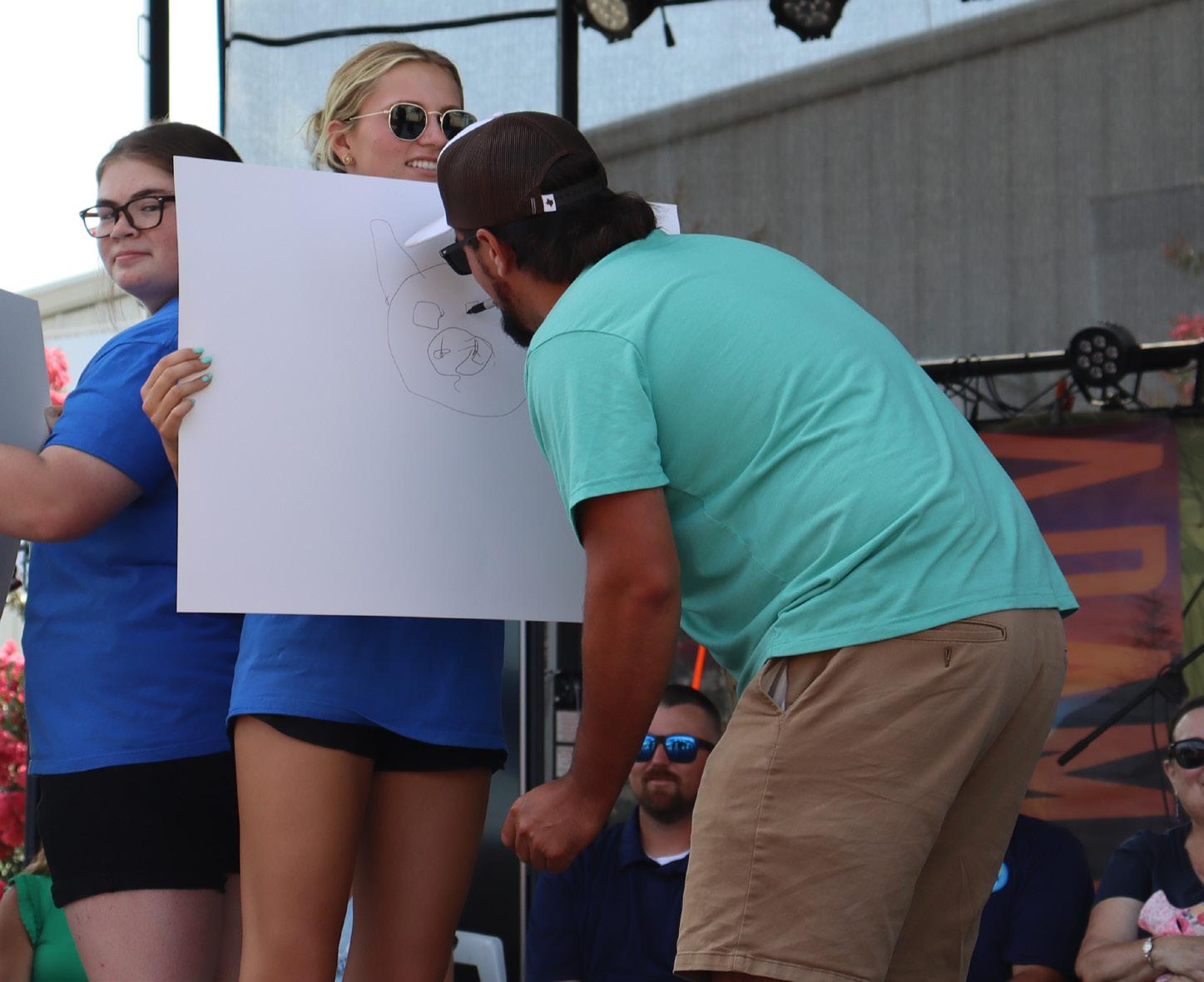
DE Young Farmers and Ranchers Chair Will Powers competed to draw the best pig without using his hands in the Pig Kissing Contest.
Delaware Farm Bureau Promotion & Education Com-
mittee Launches “Stories from the Field” Podcast
By Jaiden Cain Delaware Farm Bureau
The Delaware Farm Bureau’s Promotion & Education (P&E) Committee is thrilled to announce the launch of “Stories from the Field.”
A new monthly podcast series that brings the diverse stories of Delaware farmers directly to listeners.
The podcast debuted on Friday, August 15, 2025, and release new episodes every third Friday of the month, spotlighting the behind-thescenes realities of farming across the state.
Each episode will feature interviews with Delaware Farm Bureau members who will share personal stories from decisions and technology to family history, tradition, and the future of farming in our state. “Stories from the Field” aims to
highlight the diversity of agricultural operations across the state of Delaware and showcase the farmers who nourish their local communities.
The first episode featured Chris Sylvester with Spectrum Farms outside of Felton, Delaware. Known for blending artistry with agriculture, the Sylvesters offer welcoming experiences such as You-Cut flower sessions and a variety of flower subscriptions including pint-sized spring mason-jar arrangements and deluxe bouquets of early-season favorites. Experience vivid storytelling as Chris reflects on expanding access to locally grown flowers, the importance of wholesale relationships, and the joy of farm-led connection.
This podcast series is available to listen to on all streaming pod-
cast services including Spotify and Apple podcasts. Watch for episode highlights on our social media, and a video version of each episode on YouTube.
Know someone who should be featured? Reach out to our P&E Committee via the Delaware Farm Bureau State Office at 302-697-3183 or Mikayla.Paul@defb.org.

Ask a Farmer Campaign Connects Producers and Consumers Across the Country
If you've ever wondered how soybeans become soy sauce or what kind of cow makes the best milkshake (spoiler: they all do), you're not alone—and now you don't have to wonder anymore!
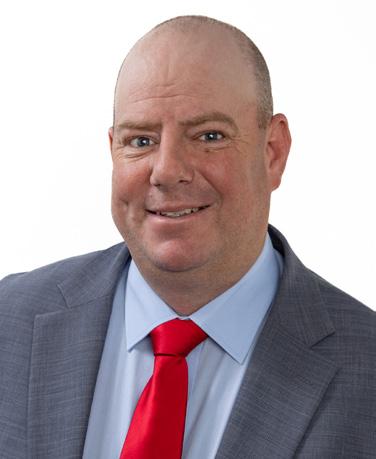
Steve Breeding DEFB 1st Vice President SCFB President
Thanks to the American Farm Bureau Federation’s Promotion and Engagement Committee, the "Ask a Farmer" program is bringing real farmers face-to-face with the folks who eat the fruits (and veggies, meats, and grains) of their labor.
This year, the national committee has taken agriculture on a whirlwind tour, showing up in places you’d never expect to meet a farmer—like culinary schools, grocery store aisles, and even Central Park and Times Square. That’s right— boots and tractors meet aprons and asphalt in the most delicious and surprising ways.
Imagine this: You’re grabbing a gallon of milk when—bam!—a
friendly farmer appears next to the dairy case, ready to chat about how your milk got from cow to shelf. At a culinary school, students in chef whites are asking farmers how to tell when corn is really sweet. And in Central Park, joggers pause to learn what “free range” really means (while politely declining a tractor ride... maybe next time).
And yes, there was even farmers in Times Square—among the flashing billboards and yellow cabs, helping people connect the dots between their take-out and a tractor.
But the excitement wasn’t just in the Big Apple. Right here in Delaware, we had a shining moment of our own when AFBF President Zippy Duvall rolled up his sleeves and joined the fun at the Delaware State Fair! President Duvall helped out at our Ask a Farmer event, chatting with fairgoers, answering questions, and showing just how passionate Farm Bureau is about building connections between farmers and consumers.
So why all the fuss? Because the Ask a Farmer program is about connection. It’s about breaking down the barrier between the people who grow the food and the people who
enjoy it (which is all of us!). The Promotion and Engagement Committee is proving that conversations over chickens and watermelons can happen anywhere—even under a skyscraper or next to a Ferris wheel.
Here at the Delaware Farm Bureau, we’re proud to support programs like these that shine a bright light on the hard work, passion, and knowledge of our farmers. Wheth-
er it’s a curious kid asking about chickens or a chef learning about crop rotation, every question is welcome—and every answer helps bring us closer to the land and each other.
So the next time you see a friendly face in a farm bureau shirt at your local store—or in the middle of Manhattan—go ahead and Ask a Farmer. We love to talk dirt.
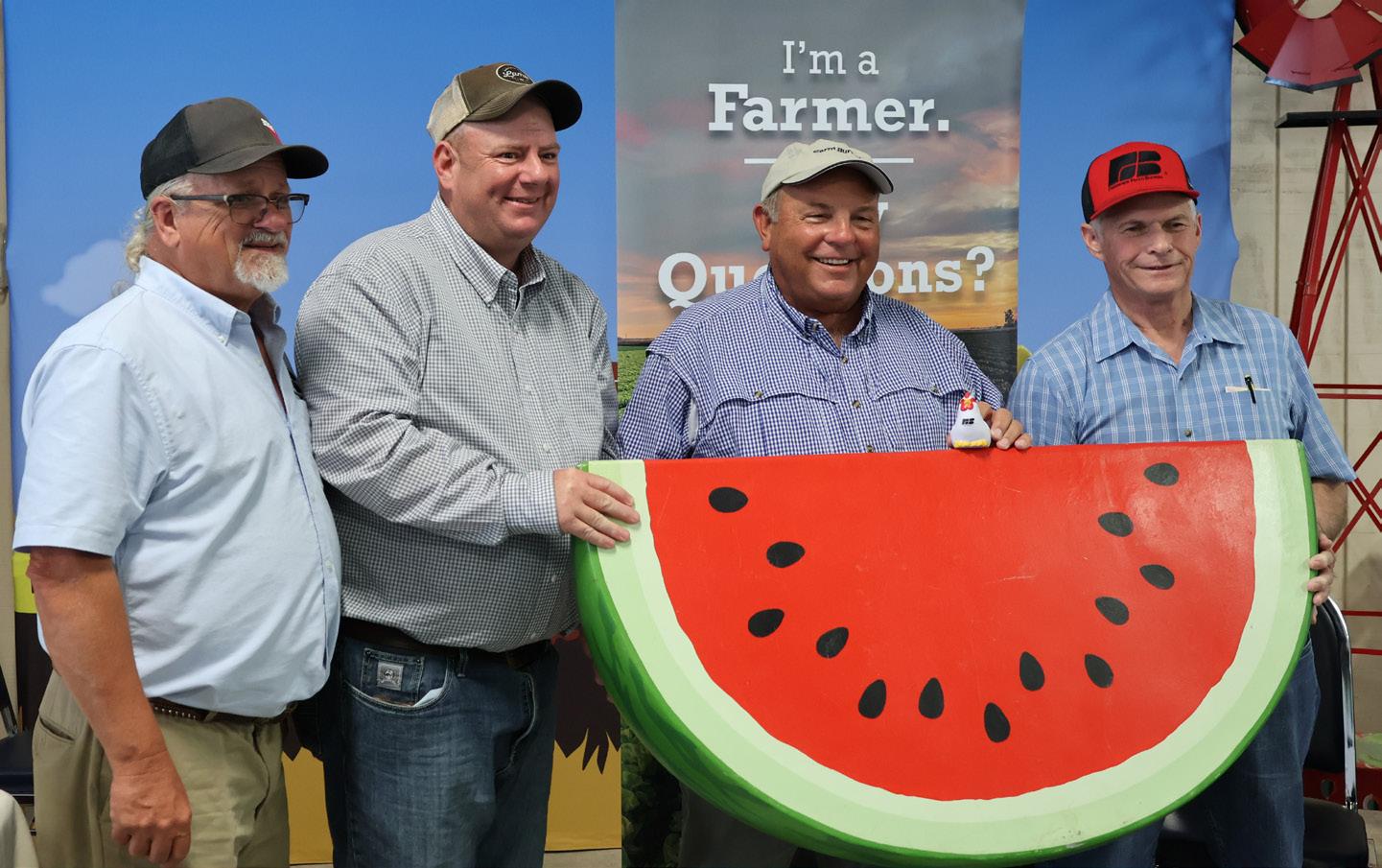
AFBF President Zippy Duvall joined DEFB members at the "Ask a Farmer" station at the Delaware State Fair.
Delaware Farm Bureau and UD Cooperative Ex-
tension Host Multi-State Agri-Tourism Bus Tour
By Jaiden Cain Delaware Farm Bureau
On August 14th, over 40 attendees participated in an agri-tourism bus tour hosted by the Delaware Farm Bureau and University of Delaware Cooperative Extension. The tour highlighted innovation and entrepreneurship in agriculture by visiting four unique agri-tourism operations across Northern Delaware, Pennsylvania, and Southern New Jersey.
Taiesha Hyacinth, who recently transitioned into agriculture, said the tour was especially valuable to her, “since making a recent career shift into agriculture, cultivation has become as essential to me as breathing. Opportunities like the bus tour are invaluable because they allow me to hear directly from producers and growers about their operations, techniques, and experiences.”
Creativity and adaptability were the common themes among the farms visited, each offering experiences that connect the community with local agriculture.
Duffield’s Farm & Market, located in Sewell, NJ, is a family-run farm offering fresh, locally grown produce alongside homemade baked goods and deli items. Open yearround, Duffield’s features seasonal activities including pick-your-own strawberries, apples, and pumpkins, as well as hayrides, corn mazes, and festive events. The farm has expanded its offerings over time to include birthday parties and a popular farm camp, a concept established by a younger family member now managing the camp. Community
involvement is encouraged through events like a scarecrow contest, where nearby schools create scarecrows displayed on the farm and customers vote on their favorites. The farm’s year-round operations are sustained by its deli and bakery offerings.
Linvilla Orchards in Media, PA, is known for a wide variety of fresh fruits such as strawberries, cherries, apples, peaches, and sunflowers, as well as baked goods like pies, donuts, and breads. Visitors enjoy pick-your-own fruit, hayrides, animal visits, pony rides, and seasonal festivals, making it a premier family-friendly destination. At peak season, Linvilla Orchards welcomes 20,000 to 30,000 visitors daily. The farm continuously seeks new ways to innovate and expand, including a recent “sit ‘n sip” picnic experience, a concept introduced by a younger family member, to offer visitors a unique way to enjoy the farm.
Mood’s Farm Market in Mullica Hill, NJ, is a family-run farm offering an extensive selection of locally grown fruits including cherries, berries, peaches, and grapes. Their market also features homemade apple cider and cider donuts. The farm is known for its wide range of youpick options, now offering over 180 varieties of crops chosen in response to customer demand. Patti Mood shared, “you just try something, and if it fails, it fails; if it kind of works, then you tweak it and try again.” This philosophy reflects their commitment to innovation and adapting to customer preferences.

Ramsey’s Farm in Wilmington, DE, offers fresh seasonal produce, Wagyu beef, and a variety of locally grown plants. Welcoming 400 to 500 visitors daily in the fall, the farm is a seasonal attraction featuring hayrides, a corn maze, pumpkin picking, barnyard animals, and festive activities like pumpkin painting and bonfires. Recently, Ramsey’s opened a new location in Pennsylvania called New Roots. Stewart Ramsey emphasized the importance of creativity, noting the success of new offerings such as goat yoga, and said, “Your possibilities are limited by your imagination.” He also highlighted the value of building strong customer connections by sourcing local products to create a convenient, one-stop shopping experience.
To wrap up the day, Hyacinth reflected on how meaningful the
experience was as a new business owner. “With affordable farmland becoming scarce and conventional practices dominating much of U.S. agriculture, connecting with these individuals is vital—not only to learn, but also to grow and carry forward their knowledge for the next generation of agricultural enthusiasts. This tour was particularly meaningful because I am no longer just a consumer, but a business owner. I was extremely grateful to hear from farmers who have excelled in this craft.”
From scarecrow contests to goat yoga, the tour showcased just how creative and essential local farms continue to be in our communities. To learn more about Delaware Farm Bureau and upcoming events, visit defb.org.
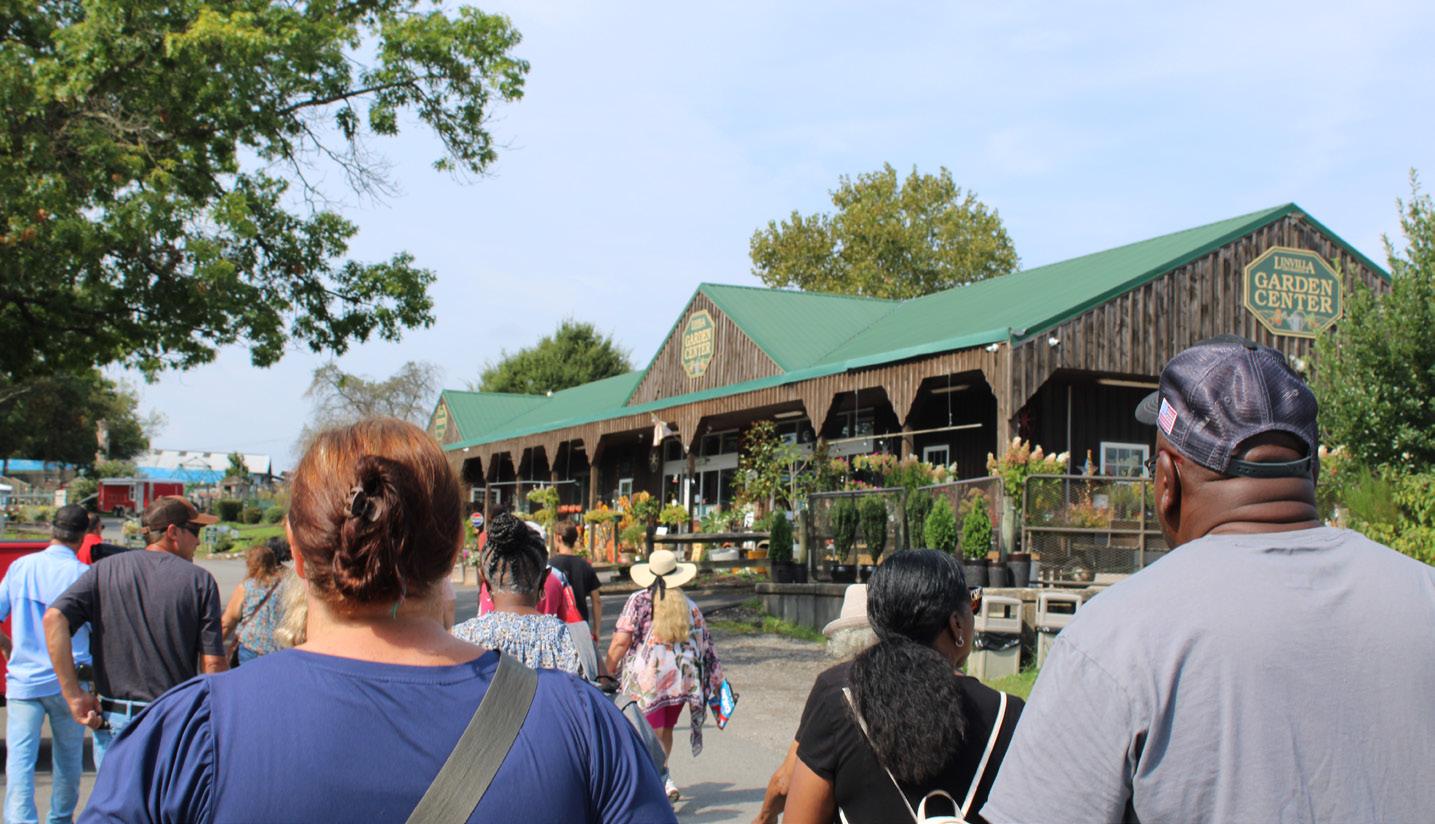
Attendees were given tours of the farm operations to gain insights on potential ideas to bring back to their
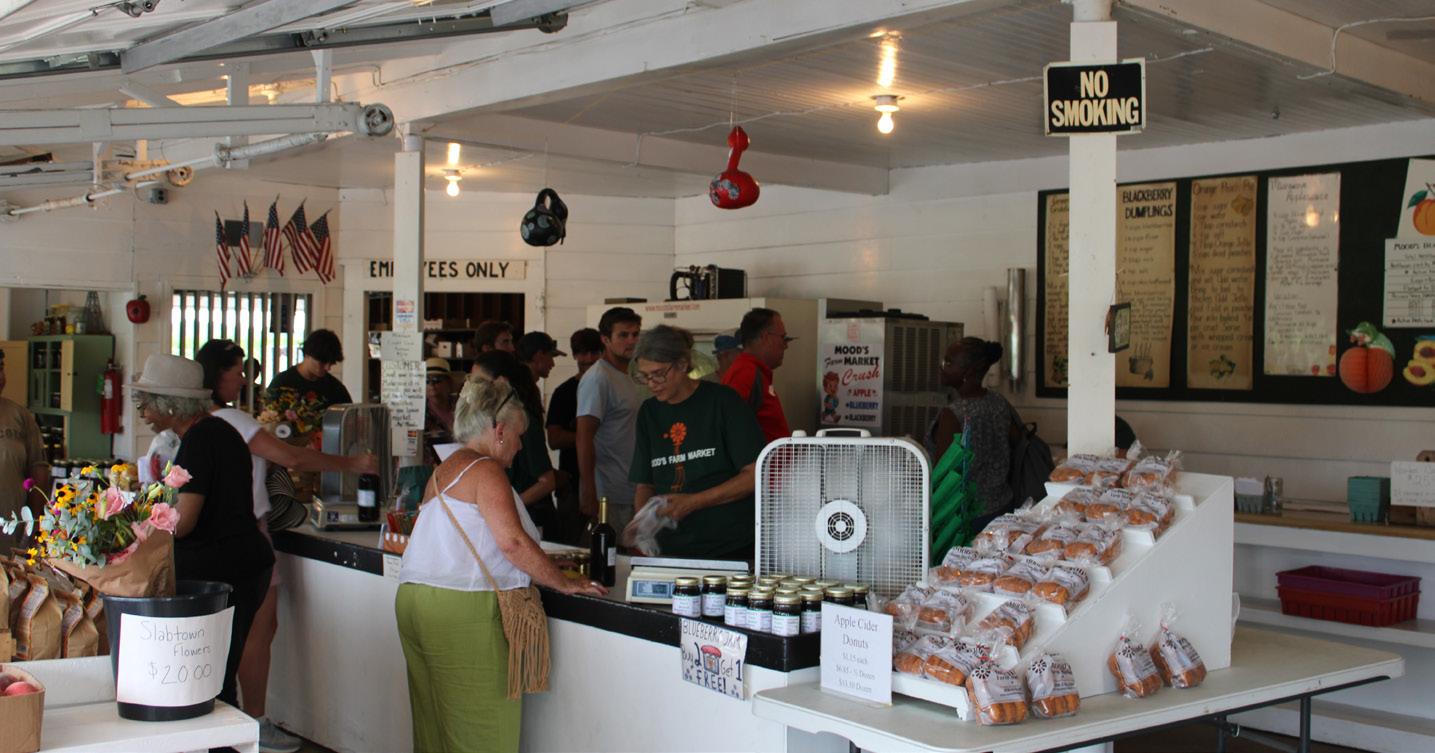
Youth in Ag Spotlight 4-H Programs Develop Leaders
Growing up in 4-H has truly taught me the essential life skills

I need to succeed. When I first joined 4-H at the age of five, I was a shy kid, completely unaware of how profoundly this organization would shape me. Looking back, the growth from that timid child to the person I am today is immense, and I’m incredibly grateful for every step of it. It first started out as a club officer where I participated in the leadership project group where I was able to plan meetings and able to learn invaluable lessons from my leaders, establishing a strong foundation on being a leader. My involvement in the Dairy lease program has also taught me valuable lessons from hard work to how much it takes to run a farm. This early engagement
pushed me to want to become an officer at the county level which provided an even deeper understanding of leadership dynamics, sharpening my abilities and expanding my influence. All of these skills helped me pave my way to becoming a part of Delaware 4-H State Teen Council. Last year I went through the application and interview process and was able to become a State Ambassador. This is where I was able to keep growing and make an impact on my state level. I was also able to participate in Farm Bureau events through the state program helping me be more comfortable talking to legislators and more comfortable conversating with people which I am grateful for. This year I reapplied to be a part of the Delaware 4-H State Teen Council and was selected to be President of State Teen Council. I was surprised and excited and only could think back to where I started as a shy five-year-old to someone capable of confidently speaking in front
of groups, facilitating workshops, and leading members, all while striving to embody the qualities of a compassionate and effective individual. I couldn't have done it without my leader Ms. Elaine Webb, who has helped me every step of the way. But ultimately the most impactful 4-H has taught me is to always “Make the Best Better”.
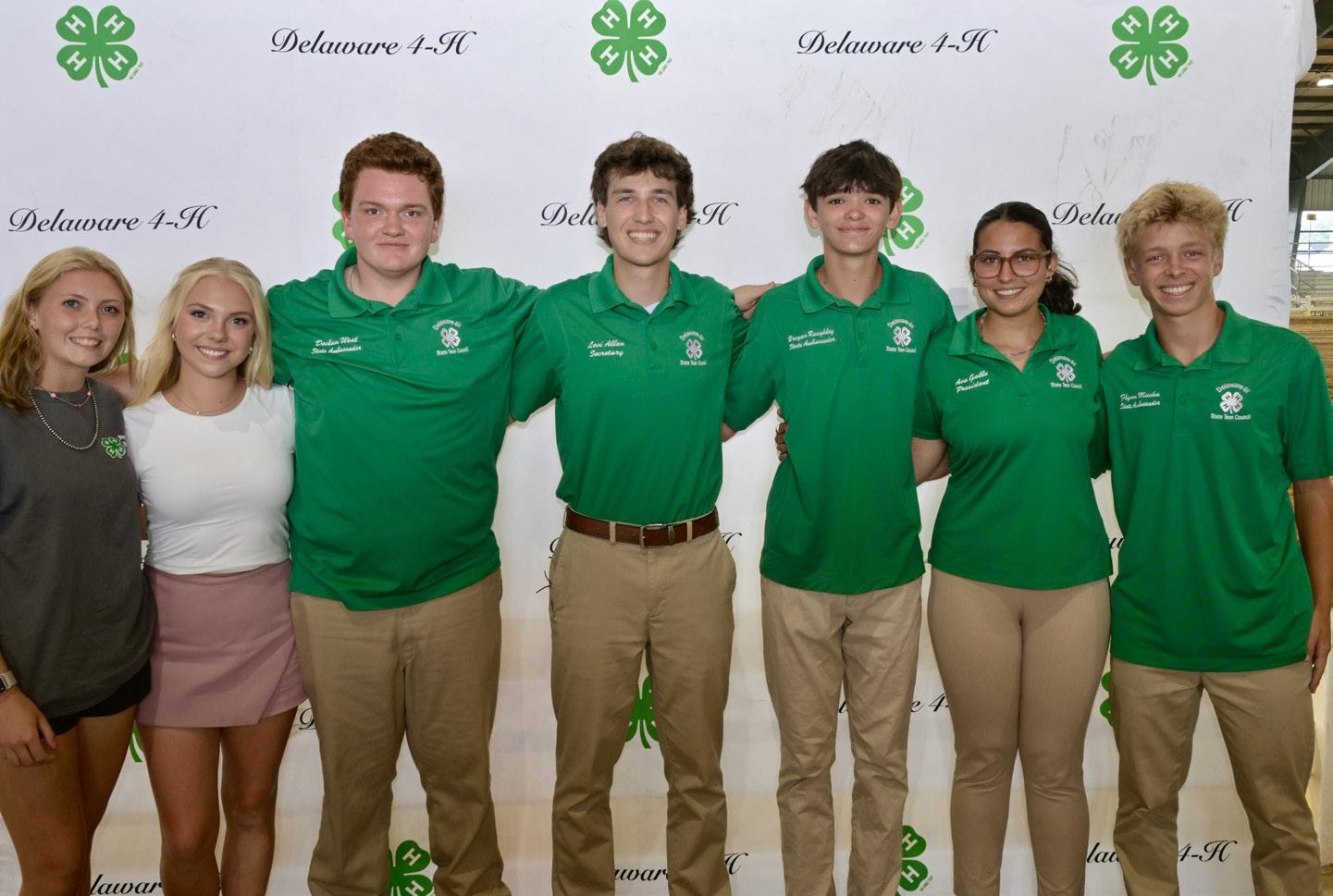
Delaware Farm Bureau Announces 2025 State Discussion Meet Competition
By Jaiden Cain Delaware Farm Bureau
The Delaware Farm Bureau (DEFB) is pleased to announce the
2025 State Discussion Meet Competition, to be held during the DEFB Annual Convention on December 13, 2025, at the Modern Maturity

Center in Dover, Delaware.
This competition is open to DEFB members aged 18 to 35 as of January 1, 2026. Participants currently enrolled in collegiate courses are eligible for the Collegiate Division, while all others may compete in the General Division.
The Discussion Meet is a unique competition that simulates a committee-style meeting where participants discuss pressing agricultural issues and explore potential solutions. The format encourages the development of leadership, communication, and collaboration skills, with participants researching predetermined topics in advance and engaging in moderated discussions aimed at reaching consensus and proposing actionable strategies.
Registration is now open at defb. org/yfr/discussion-meet. All registered participants will receive training and support from DEFB prior
to the competition.
The event will consist of two preliminary rounds, followed by an hour-long lunch break, and conclude with a final round featuring the top two competitors from both the Collegiate and General divisions. Finalists will receive a complimentary ticket to the DEFB Banquet on the evening of December 13, where the winners will be formally announced.
Winners will earn a trip to represent Delaware at the national level, either at the American Farm Bureau Convention in Anaheim, California, in January 2026, sponsored by DEFB, or at the Young Farmers & Ranchers Leadership Conference in Portland, Oregon, in March 2026, sponsored by the Delaware Young Farmers and Ranchers.
For more information and to register, visit defb.org/yfr/discussion-meet.
Flynn Mucha
State 4H Teen Council from left to right, Lexi Hay, Juliette Anger, Declan West, Levi Allen, Brogan Raughley, Ava Gallo, Flynn Mucha




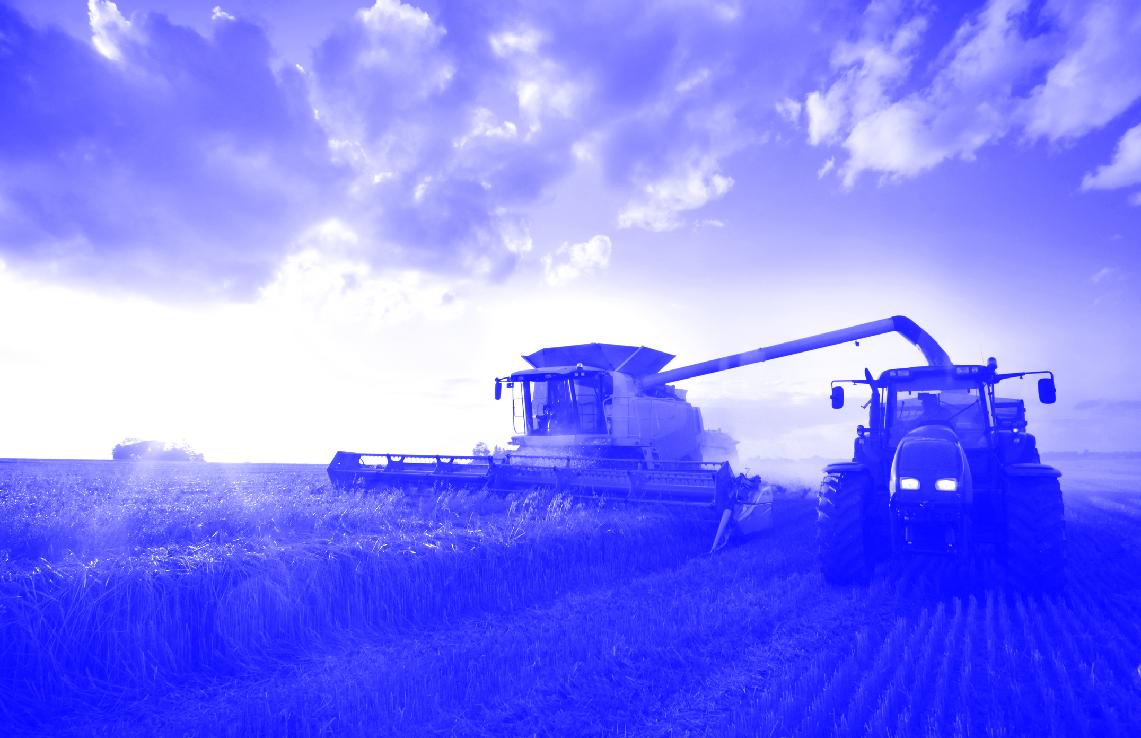
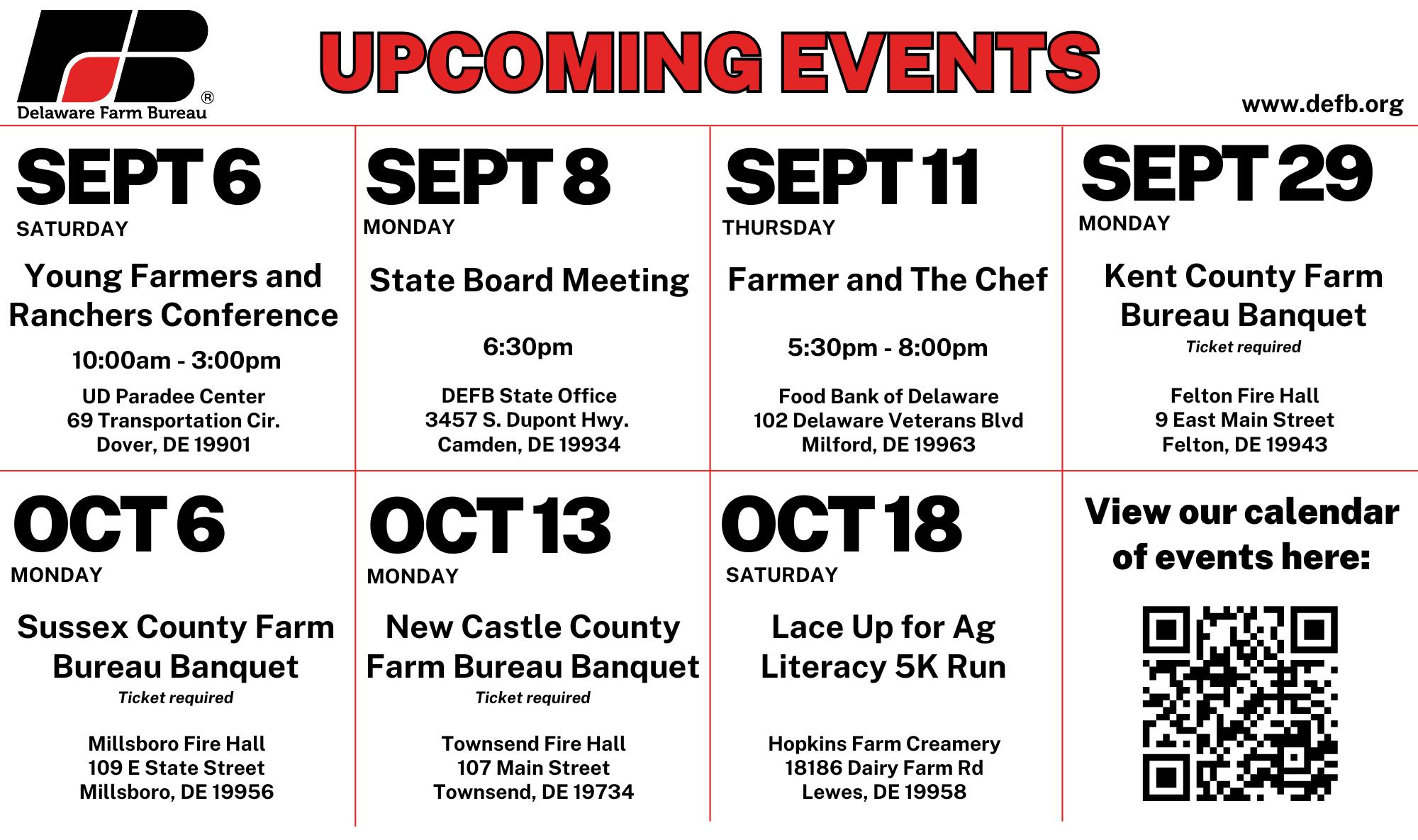

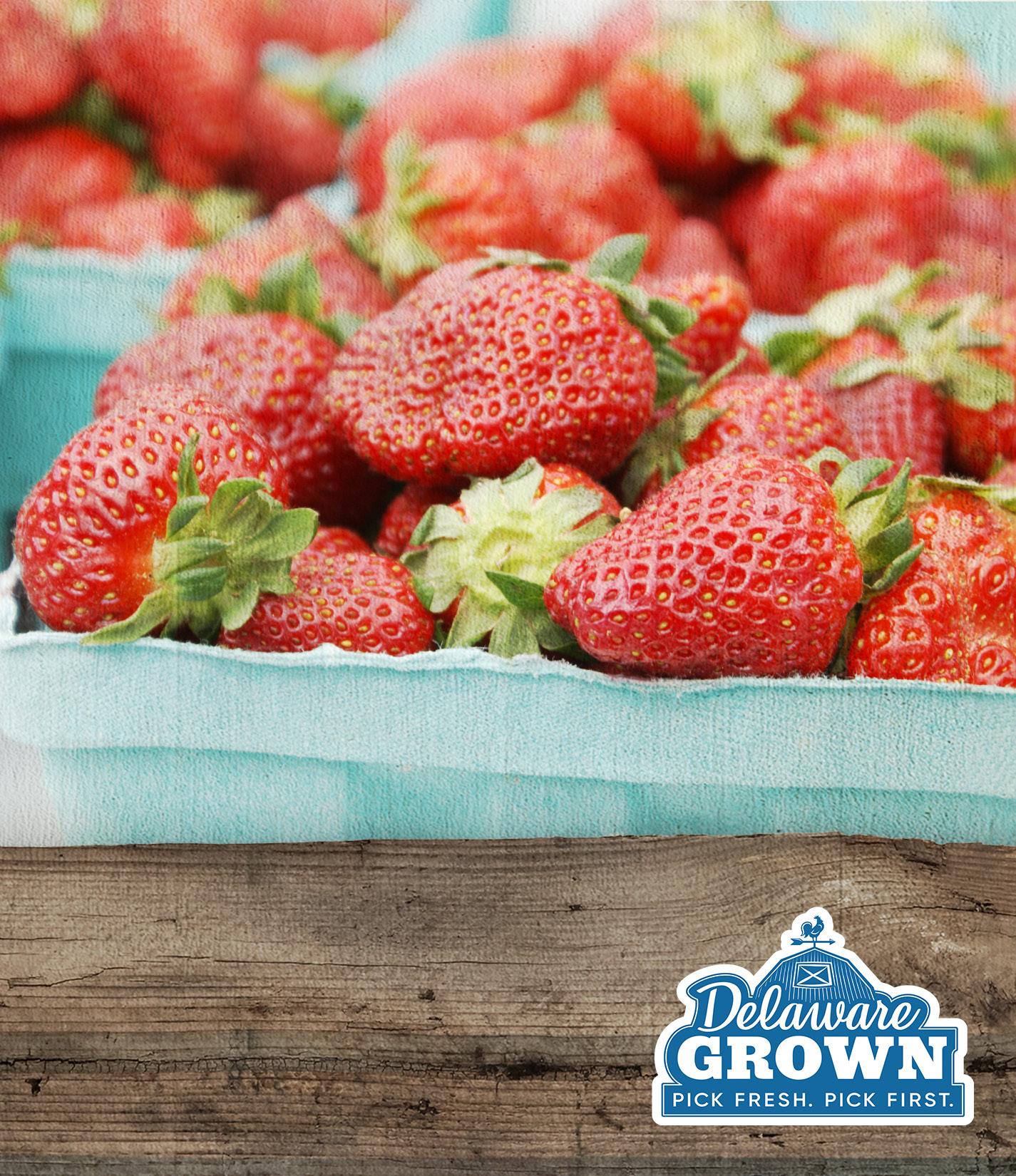
Delaware Farm Bureau Foundation Prepares for 5th Annual Lace Up for Ag Literacy 5K Foundation Focus
Runners, walkers, and supporters of agriculture are invited to lace up their sneakers for the 5th Annual Lace Up for Ag Literacy 5K Run/ Walk. The event will take place on Saturday, Oct. 18th, at Hopkins Farm Creamery in Lewes.

DEFB Ag Literacy & Program Coordinator
The race has quickly grown into a fall tradition, combining fitness and fun with the Foundations mission of building awareness, understanding and a positive public perception of Delawares farm operations and fresh local food. Proceeds from the event benefit the Foundation’s work of traveling to classrooms across the state to provide hands-on lessons about farming, food pro-
duction, careers in agriculture, and healthy eating.
Last year’s 4th annual race drew a strong crowd and raised more than $9,000 to support the program. Participants enjoyed a morning of activity and community, with Hopkins Farm Creamery opening its ice cream stand for racegoers after the finish.
“We were thrilled with the turnout last year and are excited to build on that success,” said Bill Powers, chair of the Delaware Farm Bureau Foundation. “This race is about giving back to a cause that connects young people with the importance of agriculture and where their food comes from.”
The event welcomes participants of all ages and abilities, from seasoned runners to families looking for a fun way to spend the morning. The race will begin at 9 a.m., preceded by a quick kids’ fun run to kick things off. Awards will be given to top finishers, and all partic-
ipants are invited to stay and enjoy the atmosphere at Hopkins Farm Fall Fest.
“The Lace Up for Ag Literacy 5K is one of our favorite events of the year,” said Foundation Coordinator Alexis Langenfelder. “It’s a chance to come together as a community, celebrate Delaware agriculture, and
support the educational opportunities our curriculum provides to students across the state.”
Registration is open now through Seashore Striders. For details and to sign up, visit https://runsignup.
com/Race/DE/Lewes/LaceUpforAg5KRunWalk
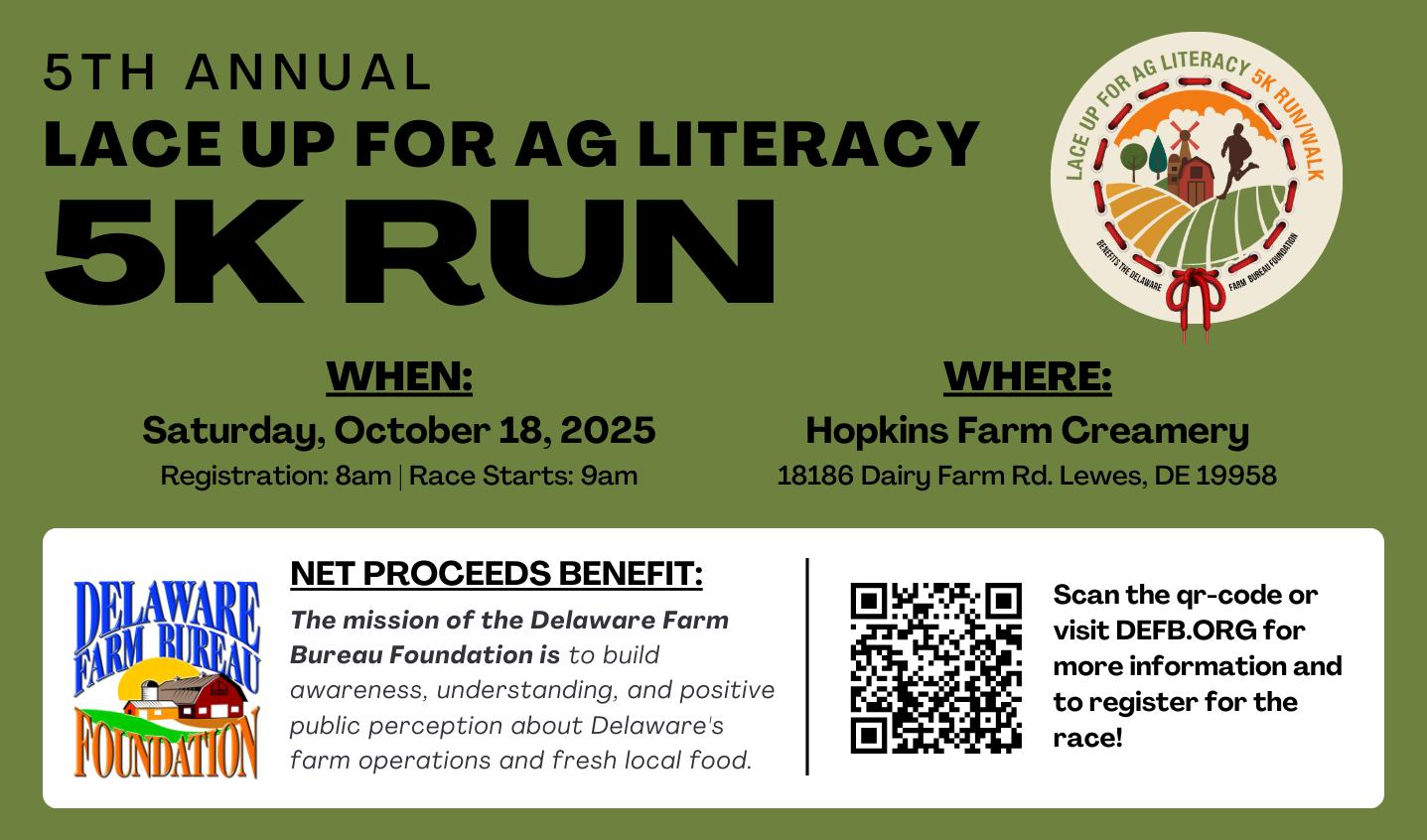
DEFB Foundation Impacts Over 2,000 Stu-
dents This Summer
By: Alexis Langenfelder Delaware Farm Bureau
This summer has been one to celebrate for the Delaware Farm Bureau Foundation. From summer camps to lively Ag Day events, the Foundation brought the world of agriculture to life for more than 2,100 students across the state. Through hands-on activities and engaging lessons, children of all ages discovered where their food comes from, why farming matters, and how agriculture connects to their everyday lives.
From May through August, the Foundation visited youth camps, Boys & Girls Clubs, and school-based events across Delaware. Students ranging from preschoolers to middle schoolers had the chance to dig deeper into agriculture, learning
about healthy eating, the journey of food from farm to table, and the many careers connected to farming.
Ag days and school career days introduced hundreds of students to agriculture all at once, while smaller camp visits provided opportunities for more in-depth conversations. In each setting, children were excited to participate, ask questions, and share what they already knew about farming, creating a strong foundation for activities and lessons.
“Every time we step into a classroom, a camp, or a field, we get the chance to inspire curiosity about agriculture. Seeing the students’ excitement makes it clear why this work is so important,” said Alexis Langenfelder, Foundation Coordinator.
As the Delaware Farm Bureau
Foundation looks ahead, it remains committed to expanding agricultural literacy across the state. By building bridges between farmers
and the next generation, the Foundation continues to plant seeds of knowledge that will grow for years to come.
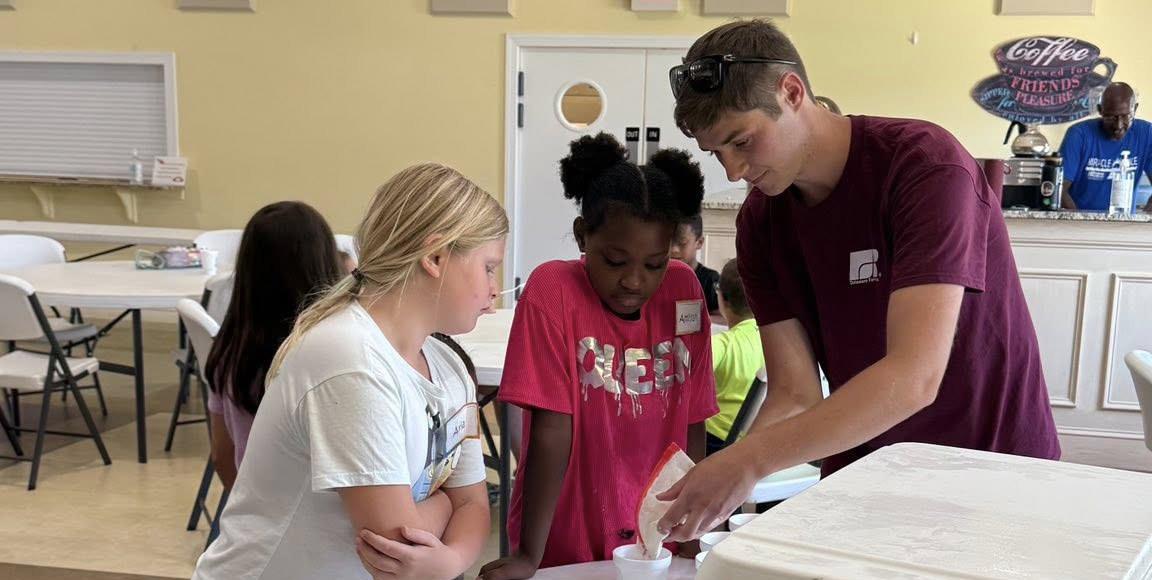
Alexis Langenfelder
DEFB Foundation Intern Noah Dixon makes ice cream with campers during a dairy lesson.
Honoring the Legacy of Past DEFB Presi-
dent Richard Wilkins
By: DEFB Staff
Delaware Farm Bureau
The Delaware Farm Bureau is grateful to celebrate the life and legacy of Richard Wilkins of Greenwood, Delaware. Richard was a lifelong farmer, visionary leader, and tireless advocate for agriculture in our state and across the nation.
Richard dedicated his life to farming and his community. From running his family farm in Greenwood to operating B&W Ag Enterprises, Inc., a trusted feed, seed, and farm supply store, he served and supported countless farmers throughout the area. His passion for the land was evident in the hundreds of acres of crops he nurtured in both Sussex and Kent counties, as well as in his thriving beef operation.
In May 2025, Richard brought his wealth of experience and passion for service to his role as State Executive Director for the USDA Farm Service Agency (FSA) in Delaware, where he helped ensure vital resources and programs reached agricultural pro-
SPECIAL SESSION
CONTINUED FROM PAGE 7
ensure future assessments are fair, transparent, and equitable.
With these legislative actions now in place and the statewide reassessment review underway, Delaware has taken important steps to address the immediate challenges faced by property owners and
ducers across the state.
A proud and active member of the Delaware Farm Bureau for many years, Richard served as President from 2018 to 2022 and previously as Kent County President. He worked tirelessly to ensure that farmers’ voices were heard and that their needs were represented in key policy decisions.
Richard’s influence reached far beyond Delaware. Through his work with the American Soybean Association (ASA), including serving as Vice President, President, and Chairman, he played a critical role in shaping agricultural policy, trade, and research. He traveled internationally, including to China for the 4th China Food Security & Food Safety Strategy Summit, where he helped foster important dialogue about global food security.
A lifelong learner, Richard began his journey in agriculture while studying at the University of Delaware, where he earned his Bachelor of Science in agriculture. Over the years, he generously shared his
farmers. The reassessment process has had a significant financial impact across the state, with farmers and homeowners among those most affected. The swift action of the General Assembly during the Special Session demonstrates the urgency of responding to these concerns and providing meaningful relief through new legislation.
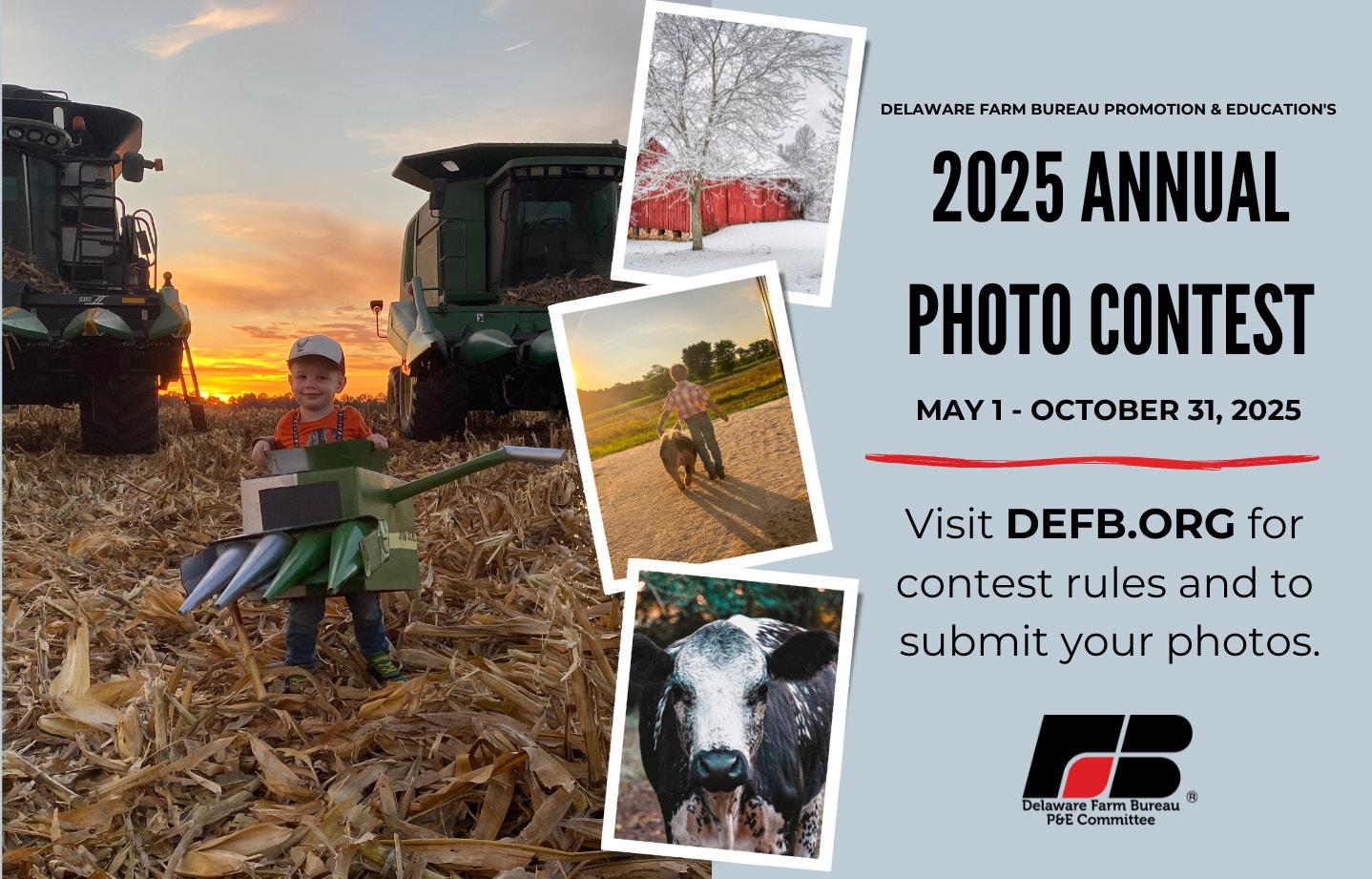
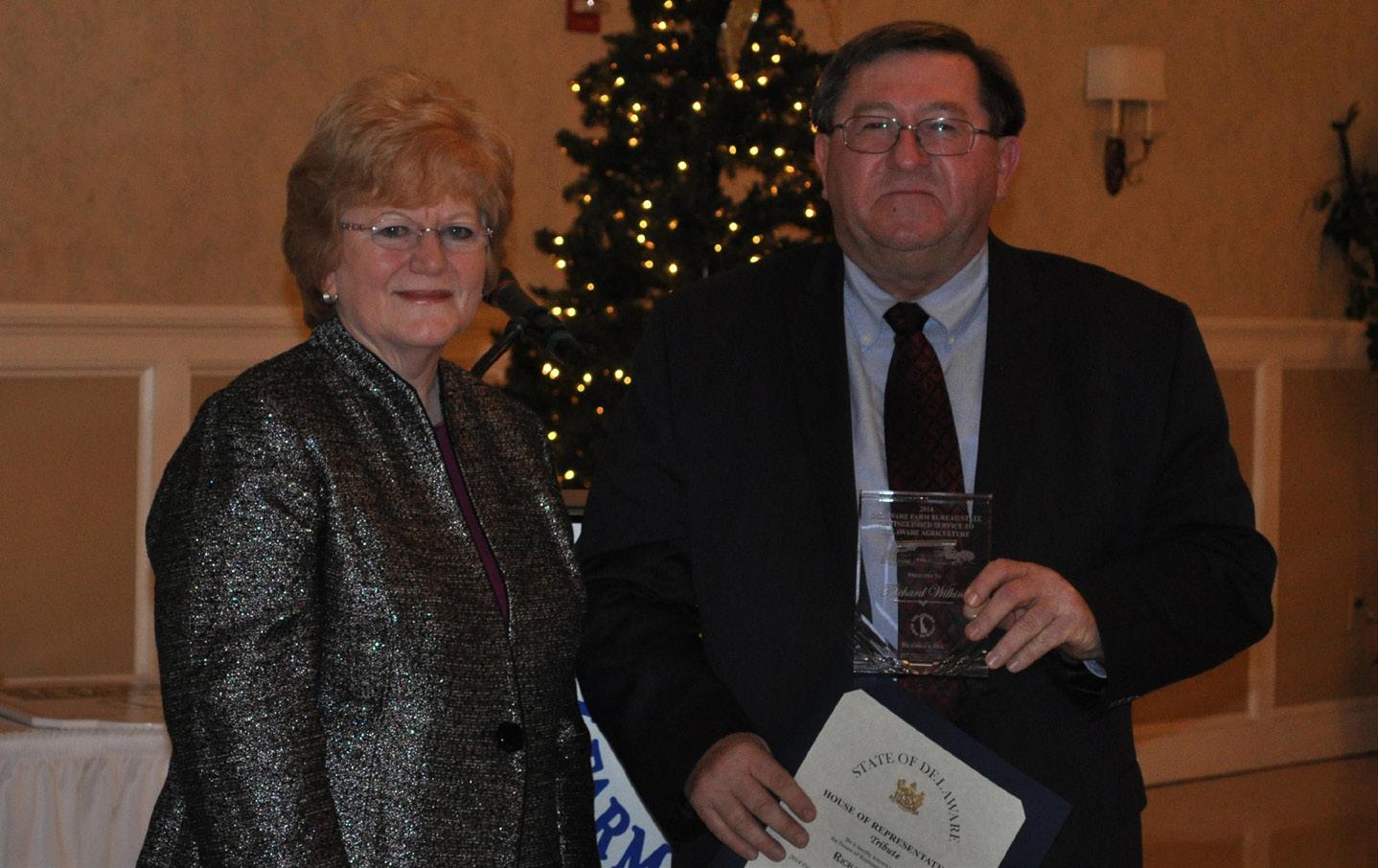
knowledge, insight, and passion with others, leaving an enduring impact on the farming community. Richard Wilkins’ life was a testament to hard work, leadership, and love for agriculture. His legacy will
While the recently enacted bills aim to improve fairness, flexibility, and oversight in the reassessment process, continued efforts will be essential to ensure long-term stability and equity. The Delaware Farm Bureau will remain actively engaged throughout the review, advocating for policies that protect farmers and promote
live on through the countless people and communities he touched, the organizations he strengthened, and the fields he faithfully tended.
a reassessment system that is fair, transparent, and sustainable for all Delawareans.
For more information on DEFB’s efforts regarding property reassessments and taxation, contact Sydnie Grossnickle, DEFB Government Affairs Coordinator, at (302) 697-3183 or sydnie. grossnickle@defb.org.

Richard Wilkins served as President of the Delaware Farm Bureau from 2018 through 2022.
Delaware Farm Bureau announces 2025 scholarship recipients
By: Jaiden Cain
Delaware Farm Bureau
The Delaware Farm Bureau Women’s Committee, Young Farmers & Ranchers Committee and the three Farm Bureau County Boards are proud to announce their 2025 scholarship awardees.
Various activities are held throughout the year to help raise funds for these scholarships. The Young Farmers & Ranchers Committee raises funds through their annual Strawberry Festival in June, and the Antique Tractor Pull which is traditionally held on the last day of the Delaware State Fair. The Women’s Committee runs a well-established food booth at the state fair, raising funds for its scholarships and other initiatives.
This year, the following students were awarded scholarships from the Delaware Farm Bureau:
Kassidy Hearn
State Women’s Committee Youth Scholarship
Kassidy Hearn of Laurel is receiving a $2,500 scholarship from Delaware Farm Bureau’s women’s committee to use towards her agricultural communications studies at Oklahoma State University.
Hearn is a 2025 graduate from Laurel High School where she was involved as an FFA chapter officer, football team manager, wrestling team manager, and talent search. She has been actively involved in National and Maryland high school rodeo and Hollering N Hooves 4-H club for several years. Outside of school,
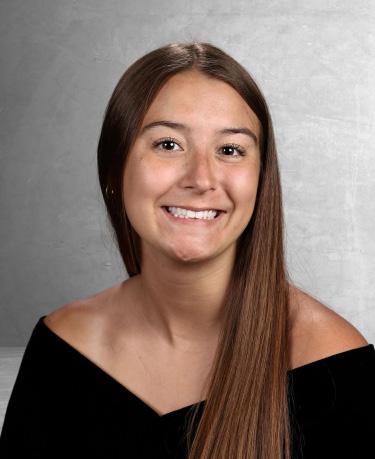
she has hours of experience working on her family’s Sandyloam Farm doing horse care, produce work, and riding lessons.
With a deep passion for agriculture, Hearn wants to be a voice for families like her, farmers who work hard to support their communities. She’s continuing to pursue these passions in agriculture communications while studying in Oklahoma.
Beau Davis
Kent County Women’s Committee Scholarship
Beau Davis of Milford is receiving a $1000 scholarship from Kent County Women’s Committee to use towards her Agriculture and Natural Resources degree at the University of Delaware.
Davis has worked as a Delaware Farm Bureau and Southern Delaware Seed intern. She is involved in UD’s Agriculture College Council, collegiate 4-H, and collegiate FFA. Davis is a 2022 Milford High School graduate who was active in her FFA chapter, student government, field hockey, and the Delaware State Fair Junior Board.
She hopes to work within the agriculture industry, narrowing her interests to economics and interning in an agribusiness analytics position.
Davis says she is blessed for the connections and opportunities this industry has given her.
Mckenna Vest
Beatrice Gooden Memorial Scholarship by Kent County Farm Bure-

au
Mckenna Vest of Clayton is receiving the $1000 Beatrice Gooden Memorial Scholarship. The 2024 graduate of Delaware Military Academy is attending the Texas A&M to study agricultural economics.
At Texas A&M Vest stays busy with Saddle and Sirloin, Agricultural Economics Society, and her College of Agriculture and Life Sciences freshman experience. When not at school, Vest helps manage her family’s farm livestock including cows, goats, and sheep. Her other extracurriculars include volunteering at Camp for All, Isaiah’s Place, Aggieland Saturday, as a Cow Camp counselor, and more.
Vest plans to become an Agriculture Marketing Specialist, hoping to bridge the gap between producer and
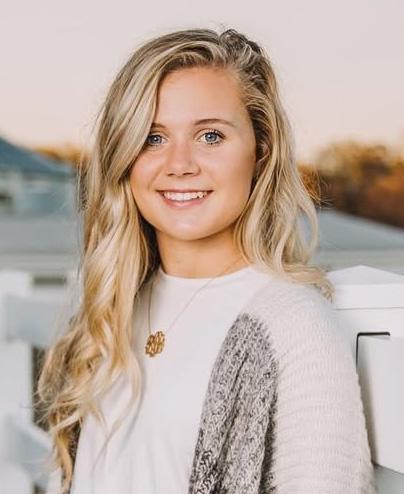

consumer while creating a more profitable agriculture sector. Her experiences as a fifth-generation farmer and talking with business professionals at the National FFA Convention have led her to pursue her passion for agriculture sustainability.
Colleen Nicholson
New Castle County Farm Bureau Scholarship
Colleen Nicholson of Townsend will receive the $750 New Castle County Farm Bureau Scholarship to benefit her education in Animal science on a pre-veterinary track at the University of Georgia. Nicholson, a 2025 graduate of Smyrna High School, was involved in her schools FFA chapter, student government association, National
CONTINUED TO PAGE 17
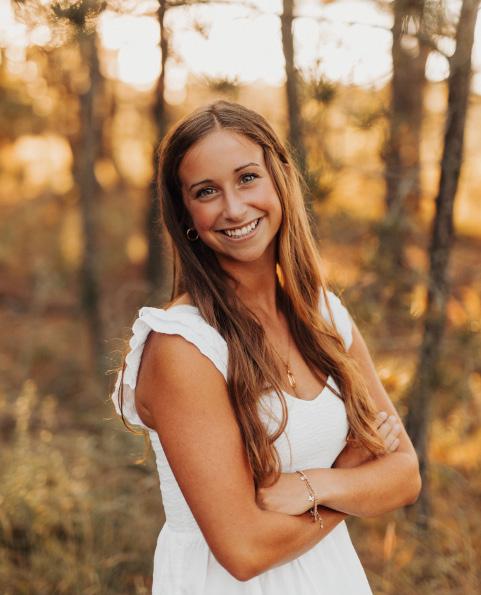

Julia Carroll, Wilmington
Emily Phillips, Georgetown
Elizabeth Handlin, Bear
Colleen Nicholson, Townsend
Brielle Carter, Harrington
Beau Davis, Milford
FROM PAGE 16
Honor Society, and education interact ambassador. She has experience in multiple roles at animal hospitals, pushing her towards her chosen studies.
Nicholson hopes to pursue veterinary school to contribute to large animal practices, a field she notes is rapidly decreasing. Her goals include becoming a mobile large animal veterinarian in her area, giving back to the community that has helped her become the person she is today. Her interests also include the poultry industry, and industry specifically important to Delaware’s agriculture.
Julia Carroll
New Castle County Farm Bureau Scholarship
Julia Carroll of Wilmington has been awarded a $750 scholarship from New Castle County Farm Bureau. A 2025 graduate from The Charter School of Wilmington, Carroll is beginning her education at the University of Delaware majoring in Food Science.
Throughout school Carrolls involvement has included pickleball club co-leader, mock trial team member, science fair participant, National Honors Society, lacrosse manager, and more.
Carroll has always been interested in food science and experimentation. Her experiences with Celiac’s and Hashimoto’s disease have exposed her to gluten-free food, an area she hopes to enhance in taste and texture through her food science degree. She hopes to one day work at food corporations, allowing her to make a positive impact on the gluten free community.
Rachel O’Day
Sussex County Women’s Committee

Scholarship
Rachel O’Day of Seaford is receiving a $1000 scholarship from Sussex County Women’s Committee to use towards her Agriculture and Medical Biotechnology degree at the University of Kentucky.
O’Day is a 2025 graduate from Sussex Academy High School. She was active in National Honor Society, Leo Club, Technology Student Association, Varsity Track and Field, Varsity Softball, and Make a Change Club. Her involvement extends into Sussex County 4-H, Delaware State Fair Junior Board, Church Sunday school teacher, and camp counselor.
On her farm she gained firsthand animal care experiences that led her to an animal science focused degree with a path towards veterinary school. Whether she commits herself to small animals or livestock, she is committed to giving back to the farming community in her future career.
Emily Phillips
Sussex County Farm Bureau Scholarship
Emily Phillips of Georgetown earned the Sussex County Women’s Committee $500 scholarship. A 2025 graduate of Sussex Academy, she attends York College of Pennsylvania with a major in early childhood and special education.
Phillips was involved in her school’s choir, drama club, and National Honor Society. She has been active in her church’s youth group, coffee bar, and served as a Sunday school teacher. Her involvement also includes animal shelter fundraiser curator and community outreach team leader over the years.
Her pursuit for a special education degree stems from her experience assisting in a Kindergarten classroom.

With a family full of teachers, she’s inspired to pursue a career as an educator.
Kaitlyn Johnson
Sussex County Farm Bureau Scholarship
Kaitlyn Johnson of Selbyville earned a $500 scholarship from the Sussex County Women’s Committee. As a 2023 graduate of Indian River High School, she continues her education as a mechanical engineering major at the University of Delaware.
Johnson has a wide range of skills from her experience on her family’s farm, Parson’s Farm bakery, and L&M Cleaning. She is also involved in the Honors Program, University of Delaware VEX Robotics, American Society of Mechanical Engineers, Ballroom Dancing Club, Crochet Club, Band, Math League, 4-H, and more.
During her education, Johnson hopes to participate in a variety of engineering-based internships and job-shadow opportunities to help decide her future career plans. She looks forward to opportunities where she can solve problems, work with peers, and constantly learn new things while bringing her knowledge back to the agricultural industry.
Brielle Carter
Delaware Farm Bureau Young Farmers & Ranchers Scholarship
Brielle Carter of Harrington received the $1,000 scholarship from the state Young Farmers & Ranchers Committee to benefit her plans of studying agriculture and natural resources with a minor in soil science at the University of Delaware.
She graduated from Lake Forest High School where she was involved in the Lake Forest FFA Chapter, Delaware 4-H, and Delaware State Fair
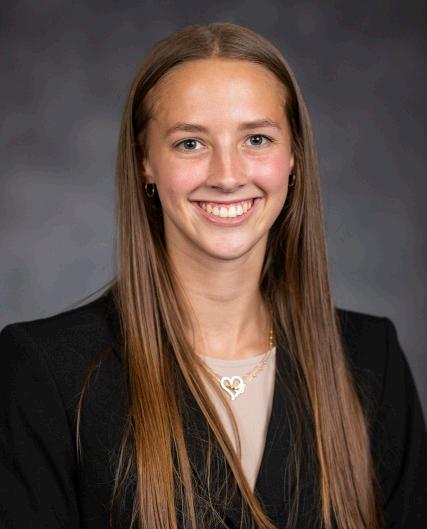
Junior Board. She now is involved in UD’s Ag Ambassador program, Agriculture College Council, served as the 2023 Mar-Del Watermelon Queen, and more. Her family produces poultry, grain, and produce.
Carter’s future plans are to combine her experiences and education to practice outreach and advocacy for the agriculture industry. While completing her degree in agriculture, she is continuing to take on new opportunities to expand her understanding of the industry.
Elizabeth Handlin
Delaware Farm Bureau Young Farmers & Ranchers Scholarship New Castle County Women’s Committee Scholarship
Elizabeth Handlin of Bear will receive the $1,000 Young Farmers & Ranchers Committee scholarship and $1,000 New Castle County Women’s Committee Scholarship.
The 2025 graduate of Odessa High School attends the University of Delaware where she is majoring in pre-veterinary science with a pursuit of a 4+1 ag education degree, taking elective plant science classes as well.
Handlin has been involved in the Odessa FFA chapter, serving as an officer at the middle and high school level. Her Supervised Agriculture Experience owning sheep has allowed her to travel across the country to livestock shows and interacting with students for hands-on learning in the classroom.
Her experiences have earned her a National SAE Grant, two Delaware state proficiencies, FFA State Degree, and 4 Blue Hen Academic All-Conference awards. Handlin plans to become an agriscience educator, becoming the third generation in her family to do so.

Kaitlyn Johnson, Selbyville Kassidy Hearn, Laurel McKenna Vest, Clayton Rachel O'Day, Seaford
AFBF President Zippy Duvall Visits the First State
By: Jaiden Cain
Delaware Farm Bureau
American Farm Bureau Federation (AFBF) President Zippy Duvall visited Delaware on Wednesday, July 23, and Thursday, July 24, 2025. During his stay, President Duvall met with Delaware Farm Bureau (DEFB) leadership and members, toured the Food Bank of Delaware, and attended the Delaware State Fair.
The visit began with a dinner hosted by the DEFB Board of Directors, providing an opportunity to share DEFB’s successes, challenges, and strategic priorities. President Duvall also got to know each board member personally and learn more about Delaware’s diverse agricultural landscape.
Thursday marked Governor’s Day at the Delaware State Fair. President Duvall joined DEFB
President Bill Powers and First Vice President Steve Breeding for the festivities. He and President Powers even participated in the FFA Games' egg toss alongside Delaware FFA members and state leaders.
Later, President Duvall attended Governor Matt Meyer’s announcement of new appointments to the Governor’s Council on Agriculture. The newly appointed members include Jackie King, Kristy Baxter Malin, Elizabeth Patrick, and Gwendolyn Pierce. Returning council members are Chair Robert Fifer, Mark Wilson, and Paul Cartanza Sr. These members, many of whom are DEFB members, bring a wide range of experience in agriculture to the council.
During the event, both President Duvall and DEFB President Powers expressed appreciation
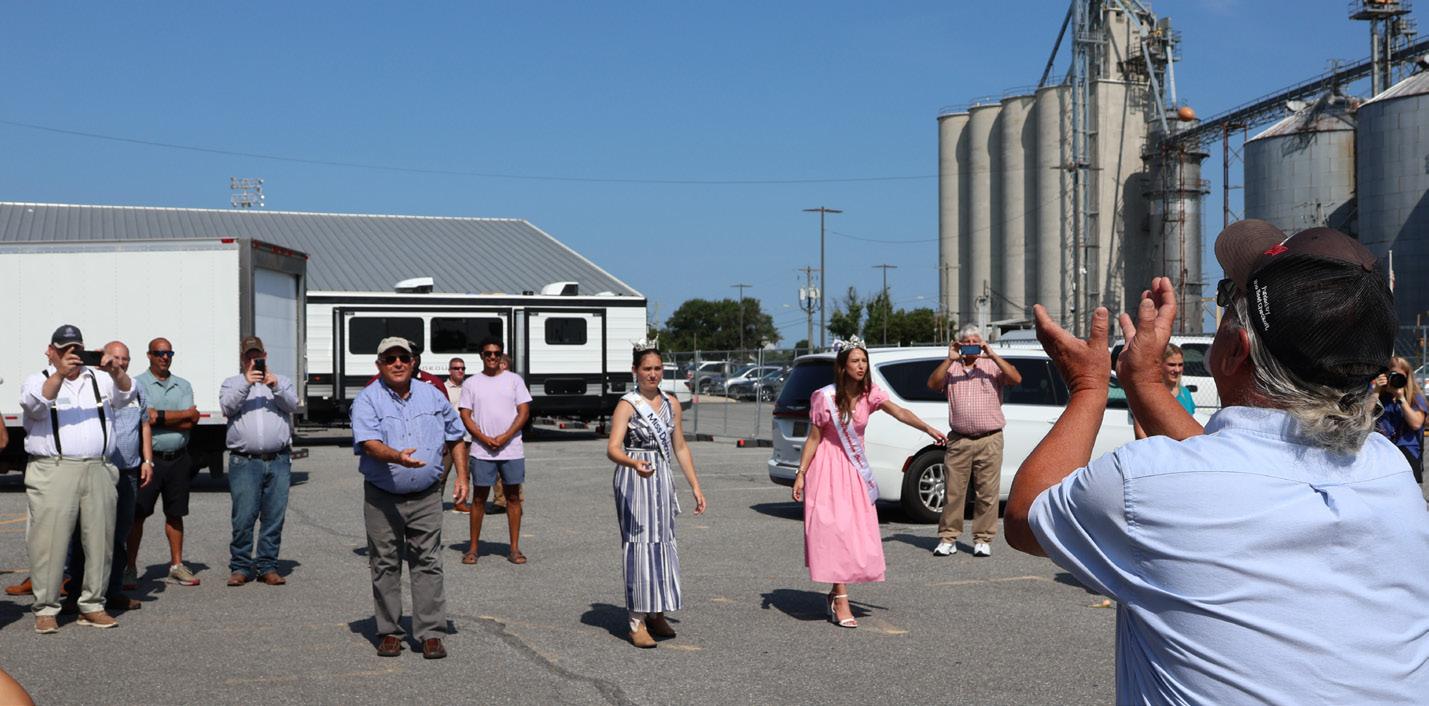
THE ZIPLINE
CONTINUED FROM PAGE 3
in protecting our ability to produce a crop and in promoting regenerative practices on the farm. America’s farmers rely on innovative researchers at land-grant universities and the safe regulatory process established by the Environmental Protection Agency to get us the tools we need to grow safe and healthy food. What’s more, I underscored to the President that most farmers live on the land where they use these products, so safety is of the utmost importance for our families and the families we’re growing food for.
for the Governor’s recognition of agriculture as Delaware’s leading industry.
“You don’t know how lucky you are to have a governor that will stand behind a podium and appoint people to an agriculture committee and also talk about the value of what agriculture brings to this state,” said President Duvall.
He emphasized that the efforts of DEFB and President Powers contribute to the broader mission of protecting and promoting agriculture at the county, state, and national levels. He urged farmers to continue sharing their stories, stating, “Ninety-eight percent of people in this country are free to do what they want to do because less than two percent of us decide to grow the food and fiber they consume every day.”
That afternoon, President Duvall
participated in DEFB’s new “Ask a Farmer” initiative, launched by the Promotion and Education Committee. Alongside DEFB Board Member John Comegys, he engaged with fairgoers at the Delaware Department of Agriculture’s Commodities Building, answering questions about farming and the agricultural industry.
To wrap up his visit, President Duvall toured the fairgrounds, watched livestock shows, visited the barns, and met with DEFB members. The experience gave him a firsthand look at the breadth of Delaware agriculture and the dedication of its youth and farming community.
For more information about the Delaware Farm Bureau, please visit www.defb.org.
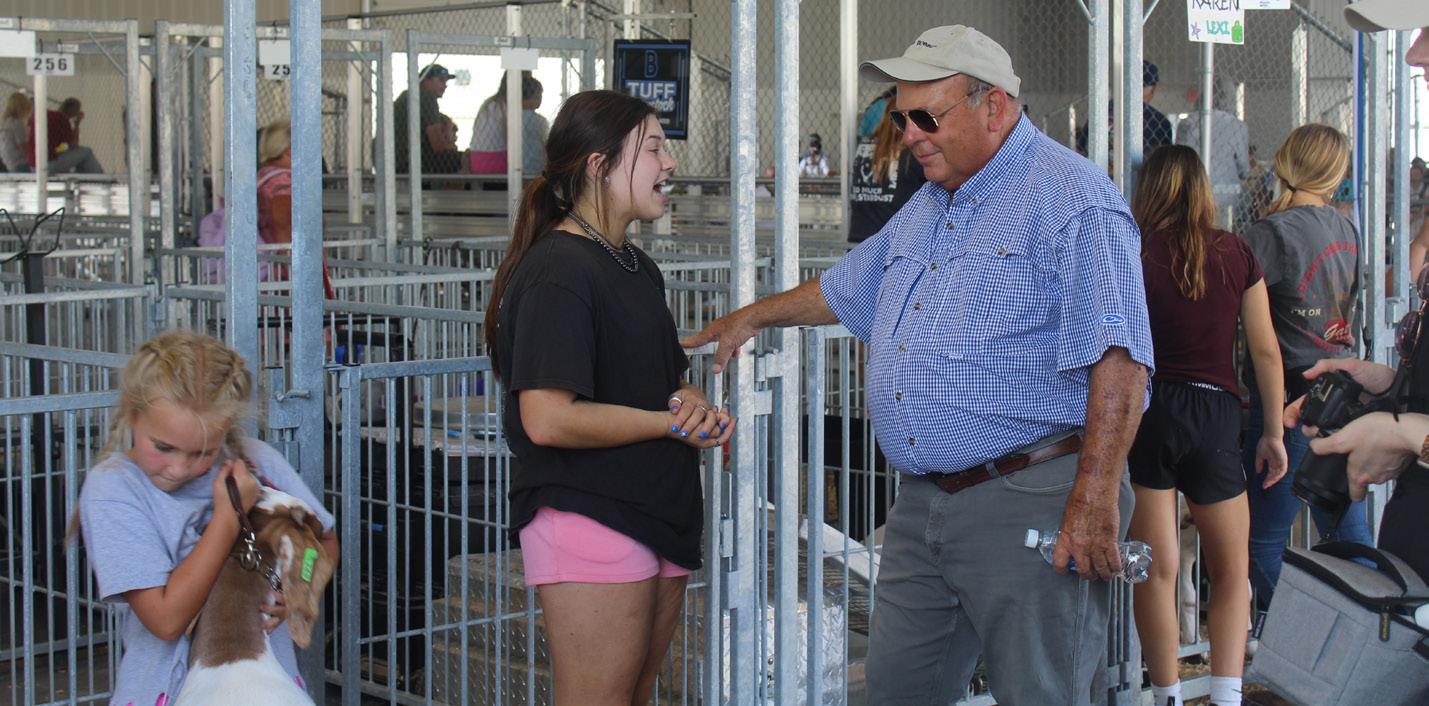
Words can’t fully express what an honor this was to speak directly with the President and share stories from Farm Bureau members. I was also grateful to be joined by Secretary of Agriculture Brooke Rollins and Secretary of Labor Lori Chavez-DeRemer. They have both been strong advocates for farmers and ranchers in their roles in the administration. Secretary Rollins also joined us the next day as the keynote speaker at the American Farm Bureau’s Council of Presidents meeting.
Every summer we gather all Farm Bureau presidents from the 50 state and Puerto Rico Farm Bureaus, as well as our national com-
mittee chairs, to hear from leaders and lawmakers. This year, our policy team at AFBF worked directly with the White House to hold our meeting at the Eisenhower Executive Office Building’s Indian Treaty Room. This was the largest gathering of our state presidents at the White House ever. We heard updates from cabinet members, including Secretary Rollins and EPA Administrator Lee Zeldin, other administration officials, and senior White House staff. Each speaker took questions from Farm Bureau leaders and expressed their appreciation for the hard work of America’s farmers and ranchers. Each meeting, every conversa-
tion—not only last week but across my time in Washington—reminds me of the power of our great federation. The American Farm Bureau, your American Farm Bureau, is the united Voice of Agriculture because of grassroots members who are committed to their farms, their families and their communities.
We know that our nation is stronger when agriculture succeeds. And thanks to the tireless work across our federation—from volunteers at the local county Farm Bureau to our dedicated staff to our state and national leaders—your voice is being heard from the local chamber of commerce all the way to the White House.
DEFB President Bill Powers and AFBF President Zippy Duvall participated in the egg toss compeition at the FFA Fair Games.
DEFB members were excited to show AFBF President Zippy Duvall their livestock that they showed at the Delaware State Fair.
Delaware hosts Northeast Farm Bureau Presidents and Administrators
By: Mikayla Paul Delaware Farm Bureau
Agricultural leaders from across the northeast region gathered this week in Dover for a dynamic three-day conference focused on leadership development, advocacy, and innovation in agriculture. The Northeast Presidents and Administrators Conference, hosted by the Delaware Farm Bureau, brought together farmers, policy experts, and industry professionals to collaborate, learn, and tour some of Delaware’s premier agricultural operations.
DEFB President Bill Powers was excited to welcome the group to Delaware. “Delaware is such a unique state. We are small but mighty when it comes to agriculture, which is our number one industry. It’s important for people to see just how diverse farming is in Delaware. We’re constantly adapting to keep agriculture strong as the state’s landscape continues to change.”
The conference kicked off Monday, August 25, with a visit to Harrington Raceway, where attendees enjoyed a behind-the-scenes tour of the paddock, followed by a welcome reception and dinner. The evening concluded with live harness racing, offering a unique opportunity for networking in a relaxed setting.
Tuesday’s agenda was filled with insightful and engaging sessions focused on leadership, advocacy, and communication. The day be-
gan with “Investing in Valuable Board Meetings,” presented by Margee Wolff, Vice President of Leadership, Education & Engagement at the American Farm Bureau Federation (AFBF). Attendees then participated in “Elevate Your Advocacy Efforts,” a dynamic panel discussion featuring public affairs professionals from CLYDE and CropLife America. Ed Kee and Georgie Cartanza delivered a compelling presentation on building global partnerships, sharing insights from the Nuffield USA Farming Scholars program. Rounding out the morning, Terri Moore, AFBF Vice President of Communications, provided an informative update on national communication strategies and efforts within the agricultural community.
In the afternoon, attendees took part in agricultural tours showcasing Delaware’s rich farming landscape. Stops included Fifer Orchards in Camden-Wyoming, where attendees enjoyed a scenic tractor ride around the farm and had the chance to sample the orchard’s famous peach ice cream. The group then traveled to Harvest Ridge Winery in Marydel, where they learned about the winemaking process and participated in a guided wine tasting. The day concluded with a farm tour and farm-to-fork dinner at Marvel Farms, highlighting Delaware’s watermelon production and the talents of local chefs.
On Wednesday, August 27, the focus turned to state-level prog-
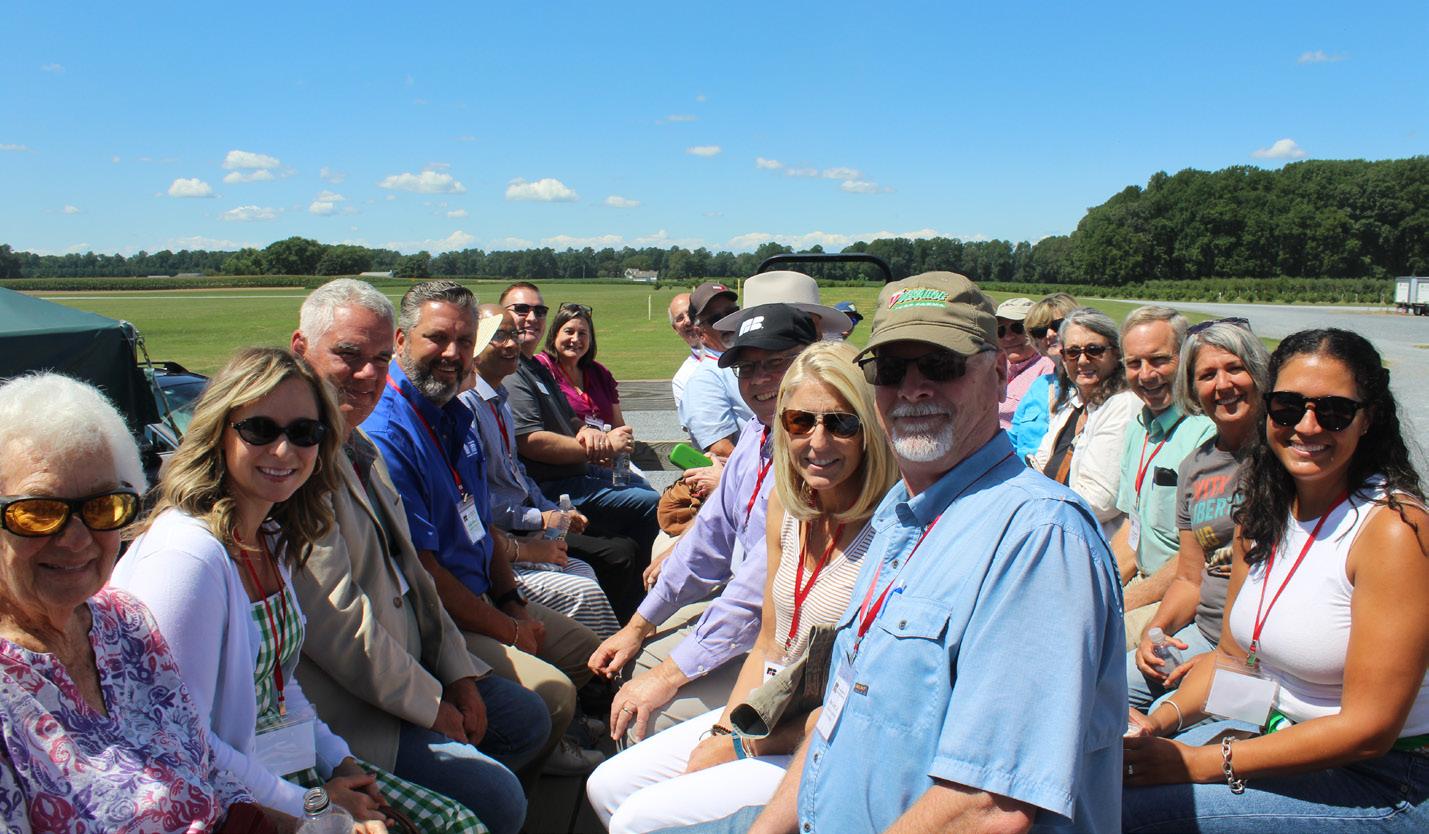
rams and member engagement. Nikko Brady, Deputy Chief of Staff for Climate, Food Systems & Planning in the Office of the Delaware Governor, discussed the Local Food Purchase Assistance (LFPA) Program, followed by a session on communicating member value with Austin Large, AFBF Senior Director of Membership & Organizational Development.
The final day also featured a visit to Shadybrook Farm, a leading potato operation in Dover, where attendees learned about potato production and observed the bagging process firsthand. The group then enjoyed a delicious seafood lunch at the iconic Sambo’s Tavern, where they connected with representatives from Farm Journal Foundation and learned more about their work in agricultural media. The conference concluded with a tour of Georgie Cartanza’s poultry ope-
ration in Dover, offering a closer look at Delaware’s poultry industry.
American Farm Bureau President Zippy Duvall praised the conference saying “Bringing together Farm Bureau leaders to learn from one another and plan for the future is incredibly important. It was also wonderful to learn more about the state's agriculture on several farm tours. Delaware Farm Bureau knocked it out of the park when it comes to planning a great meeting for the northeast region.”
The conference successfully combined leadership development with real-world agricultural experiences, fostering stronger connections between stakeholders and showcasing Delaware’s vibrant and diverse farming community.
For more information about the Delaware Farm Bureau, please visit www.defb.org.
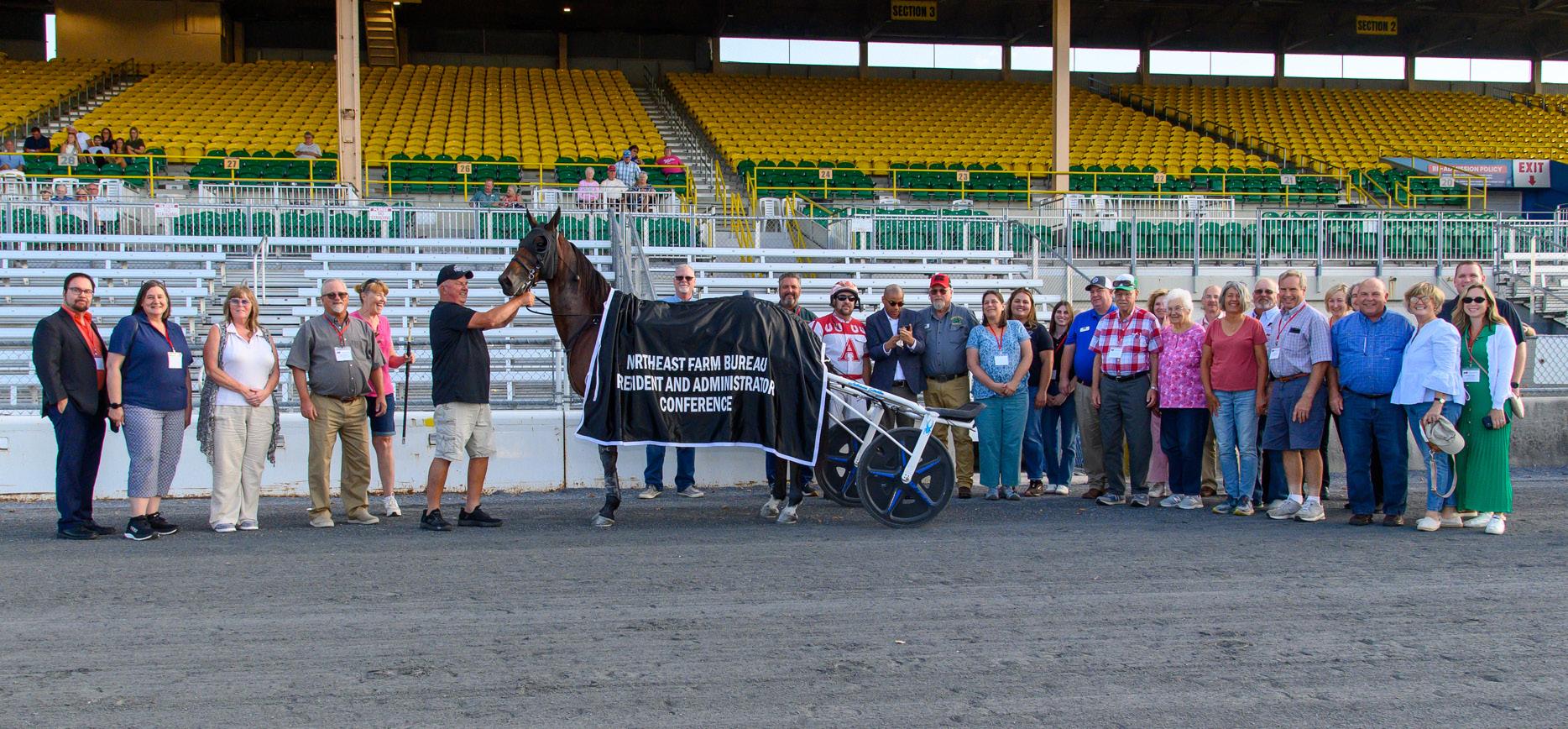

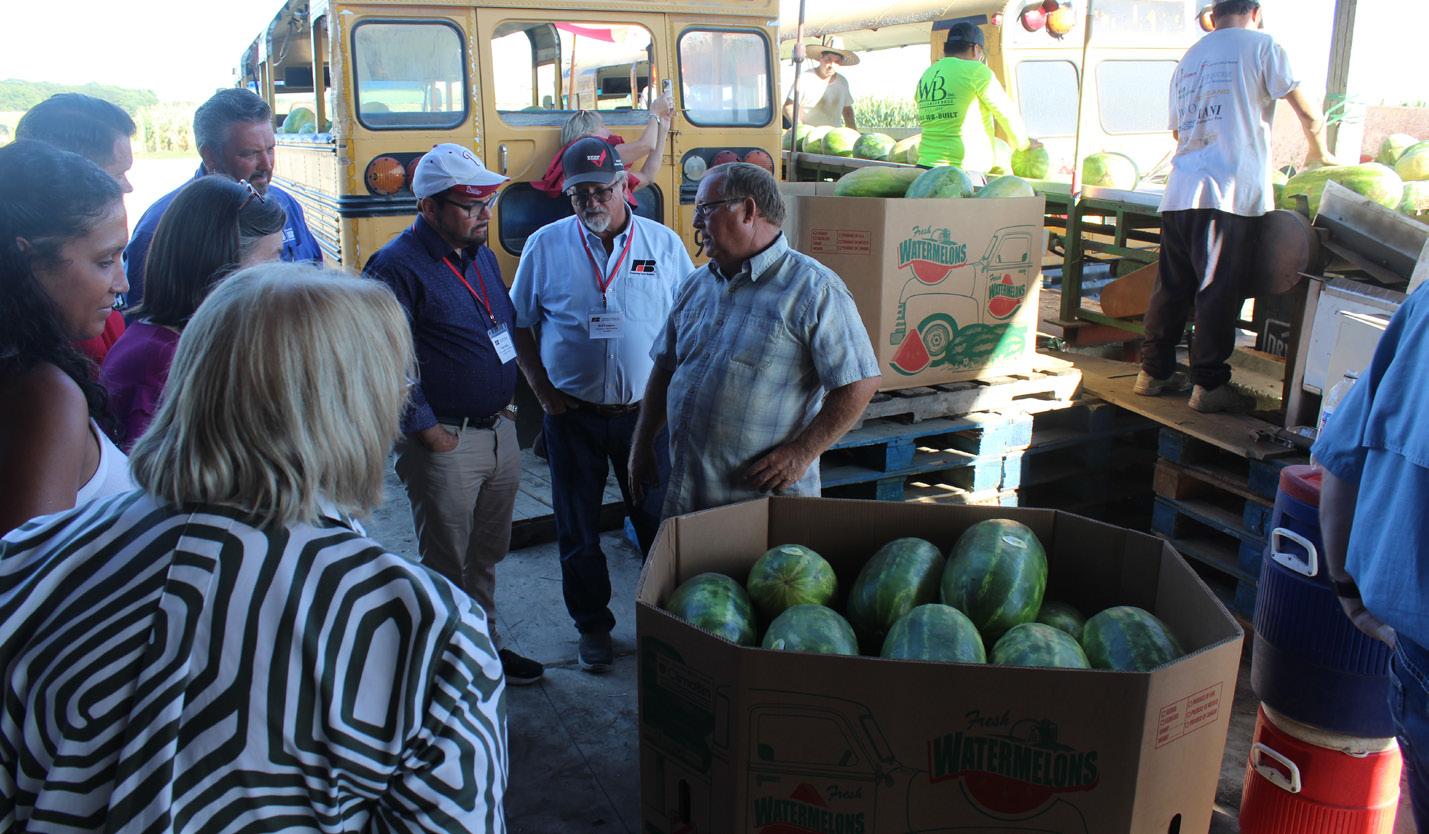
The Northeast Farm Bureau Presidents and Administrators enjoyed a hay ride tour of Fifer's Orchard.
The group toured Marvel Farms' watermelon operation before being served at farm to fork dinner.
The Northeast Farm Bureau Presidents and Administrators awarded the winner of the harness race dedicated to the group with a blanket.
Updates from AFBF
Inflation and Interest Continue Driving up Farmers’ Costs

While inflation has since softened, so too have prices for many of the crops grown by U.S. farmers. Meanwhile, interest rates remain above typical 21st-century levels as the Fed works to address inflation. This Market Intel provides an update on inflation and the impacts on farmers.
Inflation
Inflation is the rate at which the prices for goods and services rise. As inflation increases, it pulls down the purchasing power of money, meaning each dollar does not go as far. According to the Fed, a healthy level of inflation to reflect general economic growth is
about 2%.
The Bureau of Labor Statistics (BLS) measures inflation using their Consumer Price Index (CPI)
The most recent report was released on Aug. 12 and found that the July CPI was 2.7% higher than a year ago, on par with June projections and below general expectations. Core inflation for goods and services minus food and energy is typically more volatile and hit a five-month high of 3.1%, which is slightly higher than expected by analysts.
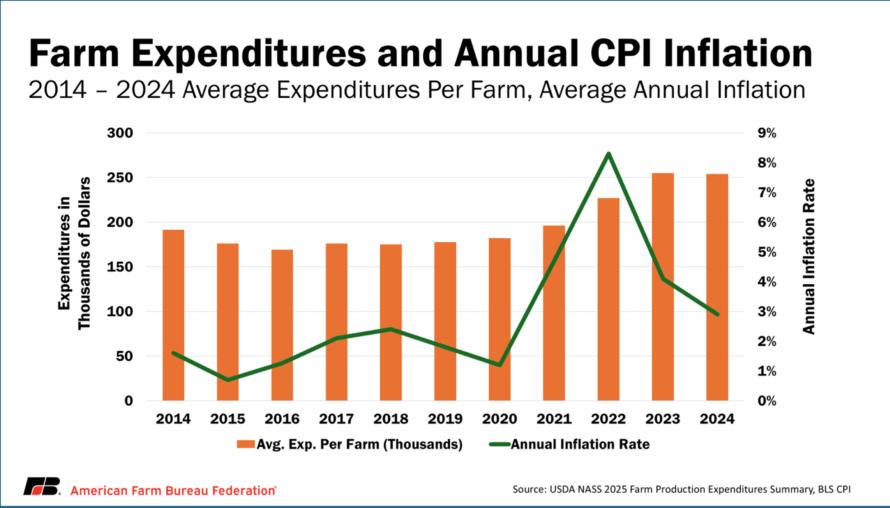
In 2020, the Federal Reserve (the Fed) responded to an acute recession by cutting interest rates and launching large-scale asset purchases to support credit and stimulate demand. Then, inflation in 2021 and 2022 reached levels not seen since the 1980s. To combat this, the Fed began raising interest rates in March 2022 to slow demand and reel in the money supply.
The Fed’s primary tool to help steer the economy is the effective federal funds rate (EFFR). This is the rate banks charge to lend their excess deposits to one another to meet minimum reserve requirements. Changes in the federal funds rate directly influence the interest rates for mortgages, auto loans, credit cards and business financing. When rates go down, banks can lend at lower costs, making it cheaper for consumers to borrow and spend and for businesses to invest, which increases demand. The opposite happens when interest rates go up.
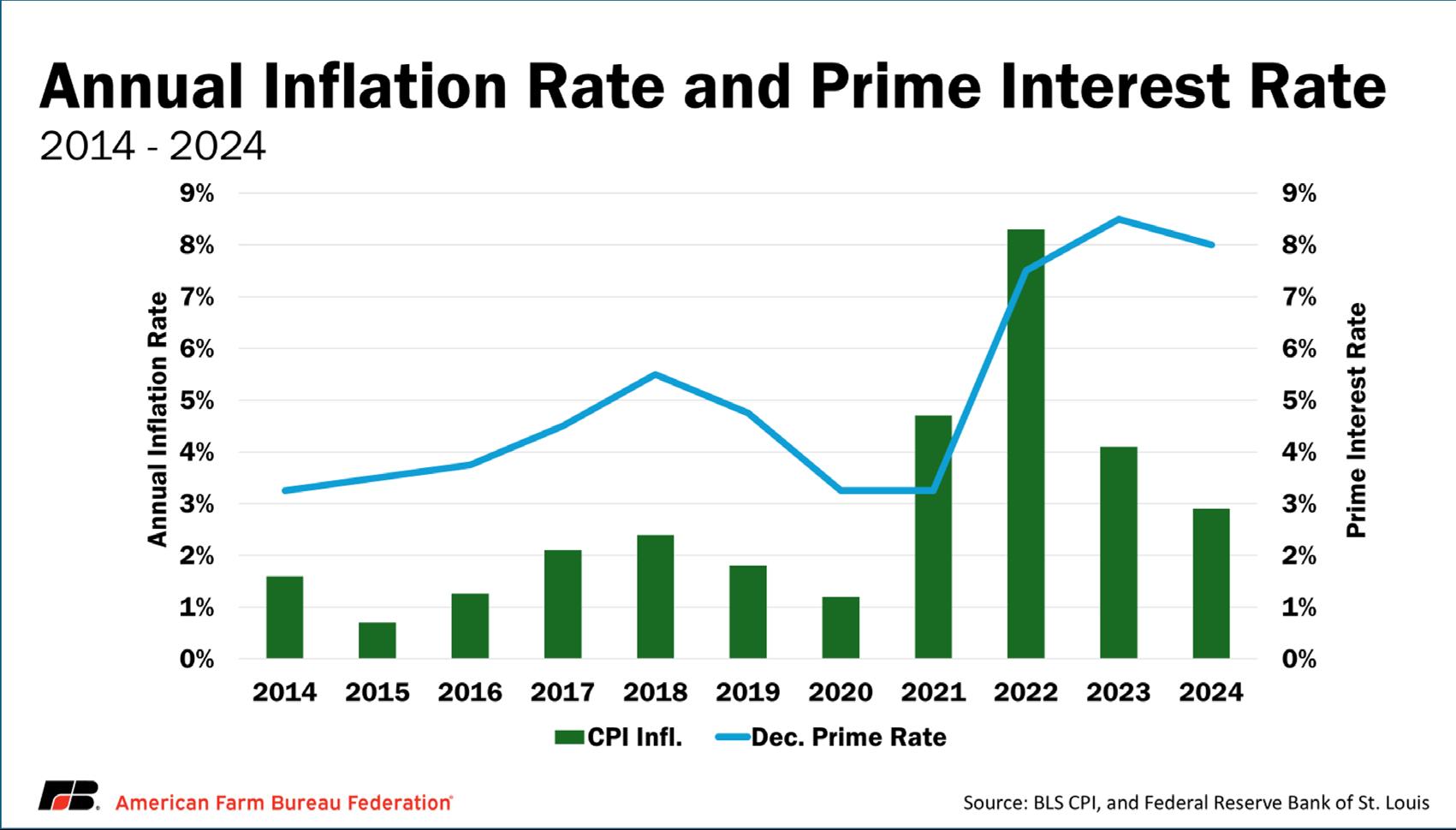
USDA’s 2025 Farm Production Expenditures Annual Summary contains the 2024 estimates of farm production expenditures like feed, farm services, rent, agricultural chemicals, fertilizer, lime and soil conditioners, interest, taxes (real estate and property), labor, fuel, farm supplies and repairs, farm improvements and construction, tractors and self-propelled farm machinery, other farm machinery, seeds and plants, trucks and autos. According to the report, total U.S. farm expenditures in 2024 are estimated at $477.6 billion, down about $4.3 billion (0.9%) from the record-setting $481.9 billion in 2023. The average expenditure per farm was $254,043 in 2024, down slightly from the record-high $255,047 in 2023. Lower inflation is partially behind the drop in expenditures because it slowed down the rise in supply costs. More importantly, falling commodity prices have reduced the price of feed for livestock.
Farm Impacts
A lower inflation rate does not mean goods and services are getting cheaper; rather, it means prices are increasing at a slower pace. For farmers and ranchers, the cost of growing crops and caring for livestock has gone up exponentially in recent years. At the same time, farmers remain at the mercy of slipping commodity prices, volatile weather conditions and an uncertain trade environment.
As previously discussed in a recent Market Intel, farm expenses have been consistently higher than the prices received for crops grown for the last five years, according to USDA’s price indexes for crop producers. The gap between prices received and prices paid has grown wider due to falling prices, particularly since 2023, but this long-term trend indicates that even higher prices have not been enough to combat the rise of input and supply costs.
Corn and soybeans account for about 52% of all planted crop acres in the U.S., making them a significant contributor to farm revenue across the country. In the August World Agricultural Supply and Demand Estimates (WASDE) report, USDA forecasted the average farm price for corn to be $3.90 per bushel in 2025/26, 35% below the marketing year average (MYA) price of $6 per bushel in 2022/23. USDA forecast the average farm
Bernt Nelson Economist
American Farm Bureau Federation
price for soybeans at $10.25 per bushel in 2025/26, 23% below the 2022/23 MYA price of $13.30 per bushel. These prices, well below breakeven for the third year in a row, have driven farms to increasingly rely on credit to continue operating.
Credit
Following the Fed’s adjustments since 2022, the EFFR is currently 4.33%, up from near-zero levels in 2020. EFFR is calculated daily and it’s important to note that EFFR is different from the federal funds target rate.
The increases in the EFFR have a substantial influence on the prime interest rate in the U.S. The prime rate is the minimum interest that banks charge their most credit-worthy customers for borrowing money. The current prime rate is 7.5% and was set Dec. 19, 2024. The bottom line is, when the Fed increased rates, they dramatically increased the cost of borrowing money across the economy. This has happened at a time when farmers and ranchers rely more heavily on credit due to the growing gap between commodity prices and input costs.
The rise in interest rates has driven up the cost of borrowing money. According to USDA estimates, the average farm spent about $6,809, 2.7% of their total expenses, on interest in 2024. The total average interest expenditure
per farm has increased by 46%, or $2,173, from $4,672 to $6,809. Meanwhile, overall expenditures have risen 33%, from $191,500 in 2014 to $254,043. The sharp rise in total farm expenditures means the steep increase in interest costs still represents only a modest share of overall spending, but credit is more critical in low price years, making it a crucial expense that continues to increase.
While the interest increase of $2,173 per farm might seem smaller than expected, it’s important to remember that not all farms carry recurring debt. This stark gap is also partly due to USDA’s broad definition of a farm, which includes any operation with more than $1,000 in ag product sales — a threshold that encompasses many very smallscale or lifestyle farms not intended to provide primary income. A financing tool commonly used by farmers and ranchers is an operating loan. An operating loan is a type of short-term loan to cover the day-to-day costs of running the farm or ranch. These loans are typically paid off and renewed every year. According to USDA’s Economic Research Service (ERS), about 22% of farms carried debt of some kind in 2022 when the Fed began raising interest rates. Interest rates for operating loans nearly
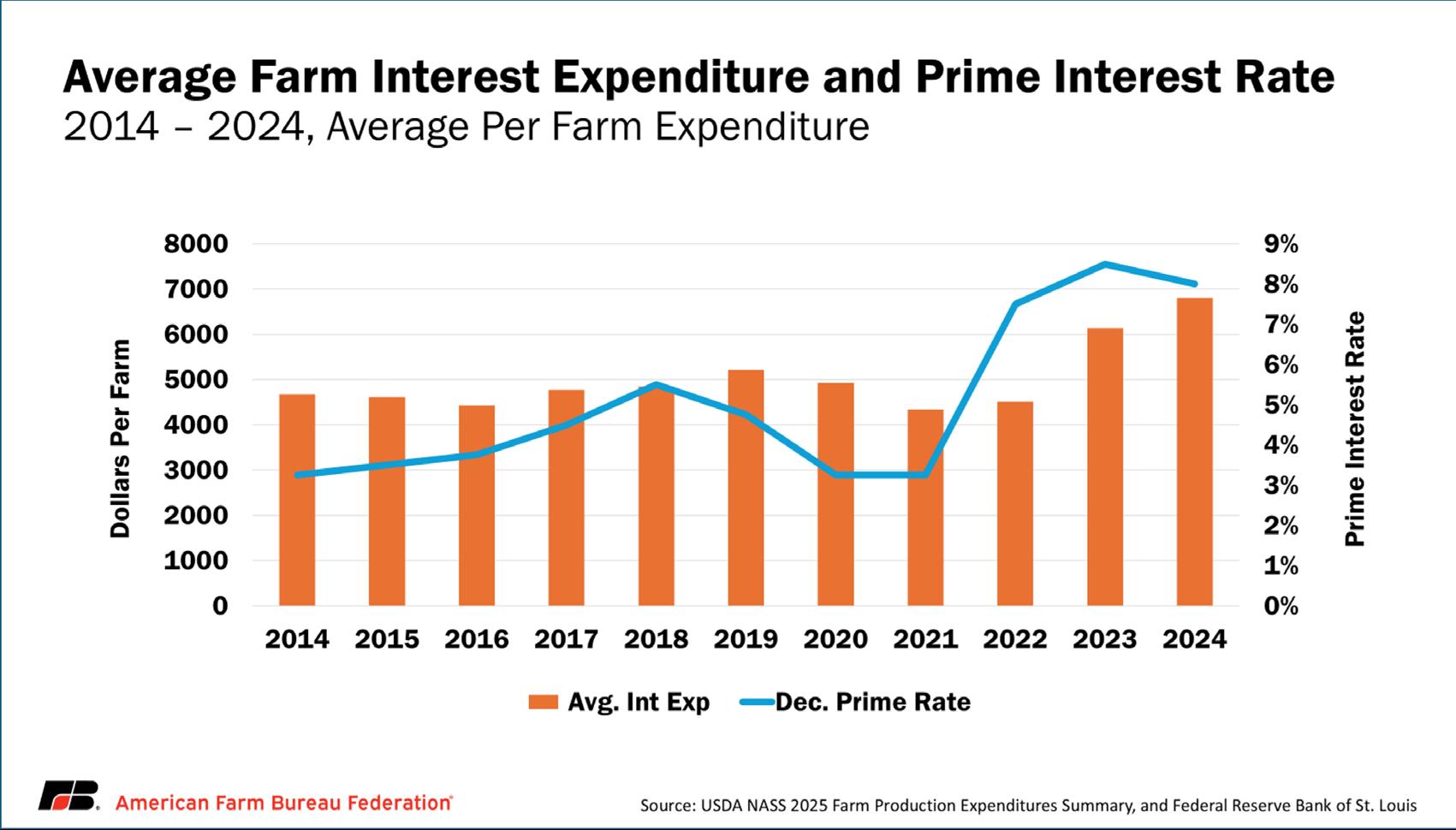
doubled between the first quarter of 2021 and the first quarter of 2023. According to the Federal Reserve Bank of Kansas City, the median operating loan interest rate was slightly below 8% for the second consecutive quarter of 2025. Despite increasing costs of credit, farmers continue to borrow more. The Federal Reserve Bank of Chicago notes about 40% of ag bankers expected higher operating, feeder cattle and FSA guaranteed loan volumes this year than last. Higher interest rates combined with higher loan volumes have only elevated the losses being endured by many farms for the third consecutive year as they struggle to cover daily growing expenses.
This means the U.S. has lost 20,000 farms since the last Census of Agriculture. The census indicated 142,000 farms were lost between 2017 and 2022, that’s more
than 77 farms per day. Worsening credit conditions are likely to add to farm losses and bankruptcies in the days ahead.
Conclusion
Without question, inflation impacts every family in America. Small businesses like farms and ranches are especially impacted by increased cost of their inputs (like seed and fertilizer) coupled with higher interest rates on the yearly operating loans necessary to acquire those critical inputs. And layered on top of inflation and the cost of interest, are plummeting crop prices and significant declines in agricultural exports. Farm country is hoping for a break in any one of the challenges they face. Will the September meeting of the Fed provide farmers and ranchers with positive news?


Nationwide News
Enhancing Worker Safety in Agriculture, Food, and Fuel Industries: Every STEP Counts

The following information is provided by Nationwide®, your approved insurance and financial services company.
In high-risk industries like agriculture, food processing, and fuel distribution, one misstep can change a life forever. According to the U.S. Bureau of Labor Statistics, the agriculture sector alone recorded 453 worker deaths in 2021—a fatality rate nearly five times higher than the average across all industries.¹ While safety standards have improved, even one preventable injury or death is too many.
Why Worker Safety Matters
A strong safety culture protects your most valuable asset—your people. It also reduces costly incidents, improves productivity, and supports long-term business success. But how do you build a culture where safety is second nature?
That’s where Every STEP Counts comes in.
Introducing the STEP Framework
Nationwide’s Every STEP Counts program is a structured, educational framework designed to help businesses reduce risk and improve safety outcomes. It focuses on four key areas:
S –
Selection and Orientation
Hire right, start strong.
This phase helps employers identify candidates with the right skills and experience for the job. It also emphasizes the importance of a robust orientation process to set expectations, reinforce safety protocols, and improve retention.
T
– Training and Safety Pro-
grams
Keep safety top of mind. Ongoing training is essential to maintaining a safe workplace. This component provides access to regulatory, general, and industry-specific safety materials to help teams stay informed and compliant.
E – Events and Losses
Respond with care and clarity. Even with the best precautions, incidents can happen. This phase supports effective reporting, offers innovative solutions during a loss, and promotes prompt, compassionate care for injured workers.
P – Post-Event Understanding and Actions
Learn, recover, and improve. After an incident, it’s critical to analyze what happened and take steps to prevent recurrence. This includes formalizing return-towork programs and conducting root cause analyses to drive continuous improvement.
Why Every STEP Matters
Understanding when and where
risks are most likely to occur is key. Research shows that 40% of worker injury claims happen within the first year on the job.² That’s why careful selection and onboarding are so important.
Investing in safety also pays off. According to the U.S. Department of Energy, employers can save $4 to $6 for every $1 spent on effective safety programs.³ The STEP program supports this with sample safety plans and access to additional training resources.
In 2022, private industry employers reported 2.8 million nonfatal workplace injuries and illnesses.⁴ Ensuring employees and supervisors know how to respond to an incident is critical that’s why the program offers an incident reporting form, toolbox talk on how to handle an incident, and technical bulletin on reporting nearmiss incidents.
And when the unexpected happens, STEP offers resources to support recovery. These include a return-to-work sample program and root cause analysis templates to help businesses learn from incidents and improve safety practices.
Take the Next STEP Toward a
Safer Workplace
The Every STEP Counts program is more than a checklist— it’s a comprehensive risk management solution. From hiring and training to incident response and recovery, the program helps ensure a holistic approach to creating and maintaining a safe workplace. Members are encouraged to take steps toward a safer, more productive work environment –because every step counts.
Learn more at Nationwide.com/ AgribusinessWorkerSafety
Nationwide, the Nationwide N and Eagle, and Nationwide is on your side are service marks of Nationwide Mutual Insurance Company. © 2025 Nationwide
References
1. CDC: National Farm Safety and Health Week
2. WCIRB: Employee Tenure and Claim Frequency Study
3. U.S. Department of Energy: Investment in Safety
4. OSHA: Workplace Safety Statistics



In 2023, 19% of deaths in off-highway vehicle (OHV) accidents were children under 16, with only 2% wearing helmets.1 This alarming statistic prompted Nationwide to launch the Let’s Champion Rider Safety® campaign, providing tips and resources for effective safety discussions and protection for young riders.
